Search Result
Results for "
BCL-2/BAX
" in MedChemExpress (MCE) Product Catalog:
2
Isotope-Labeled Compounds
| Cat. No. |
Product Name |
Target |
Research Areas |
Chemical Structure |
-
- HY-N1157
-
-
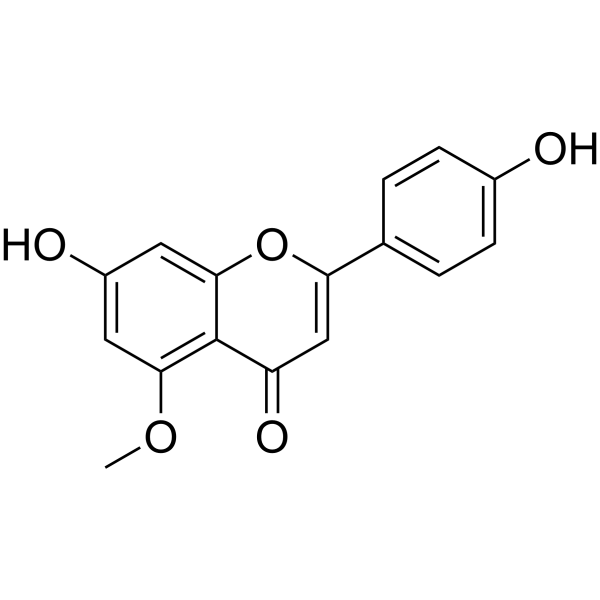
-
- HY-P2343
-
|
|
Apoptosis
|
Cancer
|
|
BH3 hydrochloride, a BBB penetrated peptide, provoke apoptosis either by direct activation of pro-apoptotic Bax/Bak or by neutralizing anti-apoptotic Bcl-2 proteins (Bcl-2, Bcl-XL, Bcl-w, Mcl-1 and A-1) via their BH3 domian .
|
-

-
- HY-147928
-
|
|
Apoptosis
Caspase
Bcl-2 Family
|
Cancer
|
|
Apoptotic agent-2 (compound 14b) induces apoptosis by down-regulation of Bcl-2 and up-regulation of Bax and caspase-3. Apoptotic agent-2 exhibits anti-proliferative activities and can be used for cancer research .
|
-
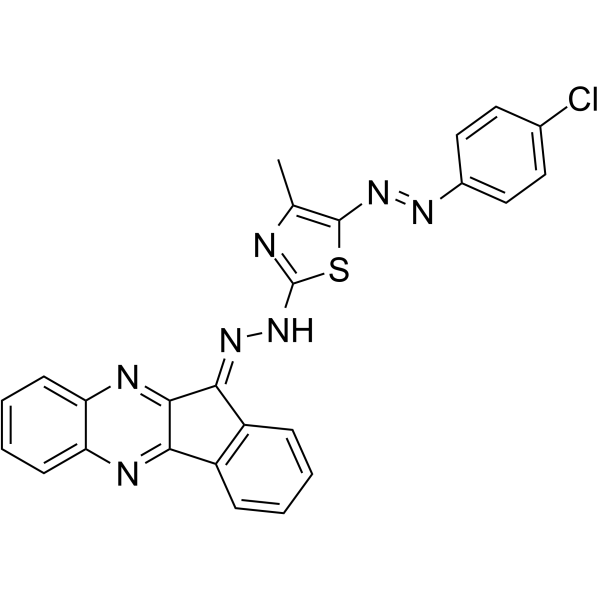
-
- HY-147906
-
|
|
Apoptosis
PARP
|
Cancer
|
|
Anticancer agent 71 (Compound 4b) is a potent anticancer agent and induces apoptosis. Anticancer agent 71 arrests cell cycle at G2/M phase and induces apoptosis through upregulating Bax, Ikb-α and cleaved PARP and downregulating Bcl-2 expression levels. Anticancer agent 71 shows antiproliferative activity .
|
-
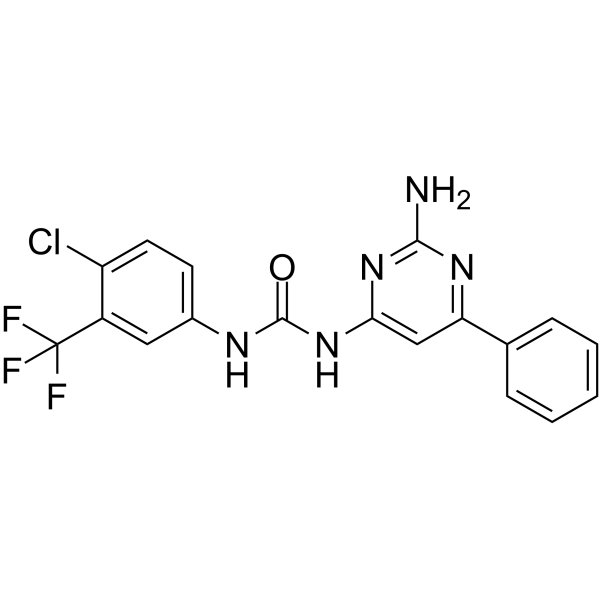
-
- HY-147929
-
|
|
Apoptosis
Caspase
Bcl-2 Family
|
Cancer
|
|
Apoptotic agent-3 (compound 15f) promotes apoptosis through the potential mitochondria-mediated Bcl-2/Bax pathway and activation of the Caspase 3 pathway. Apoptotic agent-3 exhibits anti-proliferative activities and can be used for cancer research .
|
-
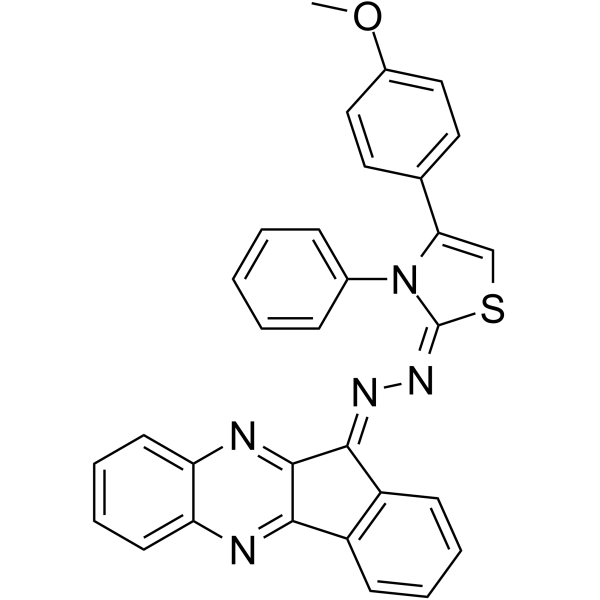
-
- HY-15191
-
|
BI-97C1
|
Bcl-2 Family
|
Cancer
|
|
Sabutoclax is a potent and effective Bcl-2 Family (Bcl-2, Bcl-XL, Mcl-1, Bfl-1) inhibitor with IC50s of 0.32 μM, 0.31 μM, 0.20 μM, and 0.62 μM, respectively. Sabutoclax increases Bax, Bim, PUMA and survivin expression .
|
-
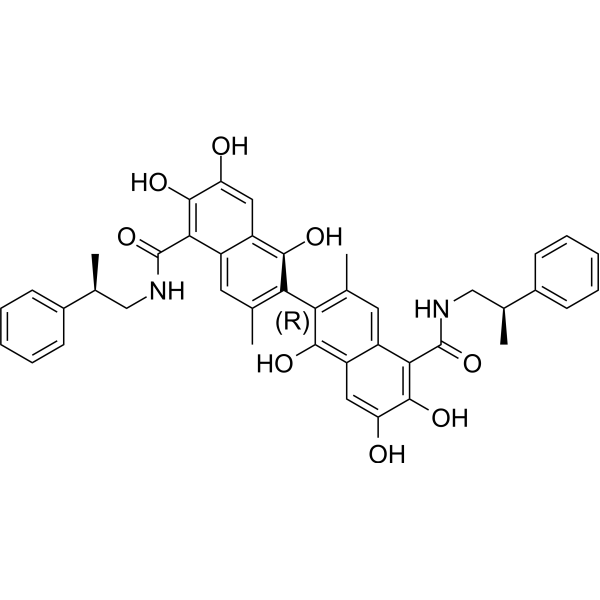
-
- HY-50907
-
ABT-737
Maximum Cited Publications
36 Publications Verification
|
Bcl-2 Family
Apoptosis
Autophagy
Mitophagy
|
Cancer
|
|
ABT-737, a BH3 mimetic, is a potent Bcl-2, Bcl-xL and Bcl-w inhibitor with EC50s of 30.3 nM, 78.7 nM, and 197.8 nM, respectively. ABT-737 induces the disruption of the BCL-2/BAX complex and BAK-dependent but BIM-independent activation of the intrinsic apoptotic pathway. ABT-737 induces autophagy and has the potential for acute myeloid leukemia (AML) research .
|
-
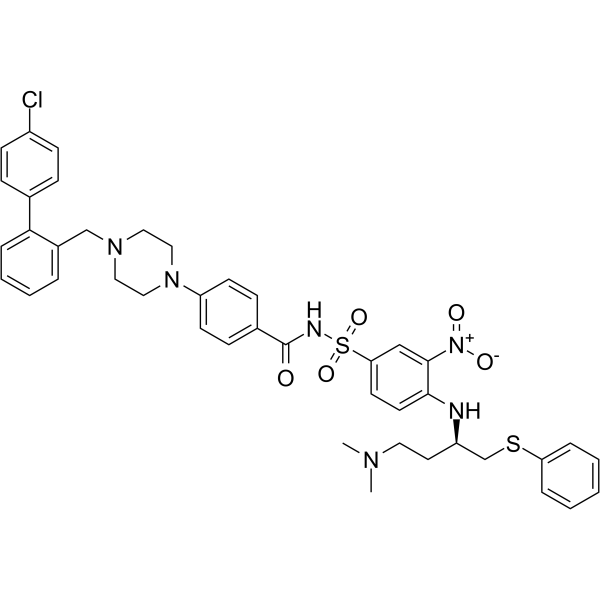
-
- HY-P5325
-
|
|
Bcl-2 Family
|
Others
|
|
Bid BH3 (80-99) is a biological active peptide. (BID is a pro-apoptotic member of the 'BH3-only' (BOPS) subset of the BCL-2 family of proteins that constitute a critical control point in apoptosis. Bid is the first of the BOPs reported to bind and activate Bcl-2, Bax, and Bak. Bid serves as a death-inducing ligand that moves from the cytosol to the mitochondrial membrane to inactivate Bcl-2 or to activate Bax.Pyroglutamyl (pGlu) peptides may spontaneously form when either Glutamine (Q) or Glutamic acid (E) is located at the sequence N-terminus. The conversion of Q or E to pGlu is a natural occurrence and in general it is believed that the hydrophobic γ-lactam ring of pGlu may play a role in peptide stability against gastrointestinal proteases. Pyroglutamyl peptides are therefore considered a normal subset of such peptides and are included as part of the peptide purity during HPLC analysis.)
|
-
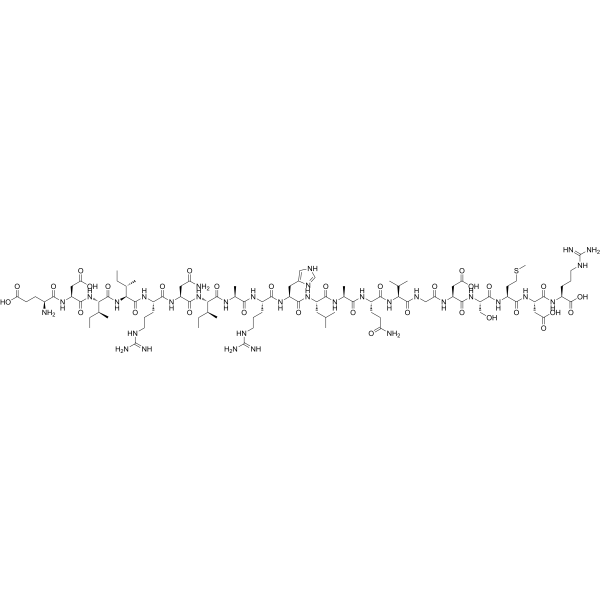
-
- HY-144792
-
|
|
Bcl-2 Family
MDM-2/p53
Caspase
Apoptosis
|
Cancer
|
|
Bcl-2-IN-7 (compound 6) is a potent Bcl-2 (B-cell lymphoma-2) inhibitor. Bcl-2-IN-7 down-regulates the expression of Bcl-2, and increases the expression of p53, Bax, and caspase-7 mRNA. Bcl-2-IN-7 induces cell cycle arrest and apoptosis in breast cancer MCF-7 cells. Bcl-2-IN-7 shows good anticancer activity, with IC50 values of 20.17, 22.64, 45.57, and 51.50 μM against MCF-7, LoVo, HepG2, and A549 cell lines, respectively .
|
-
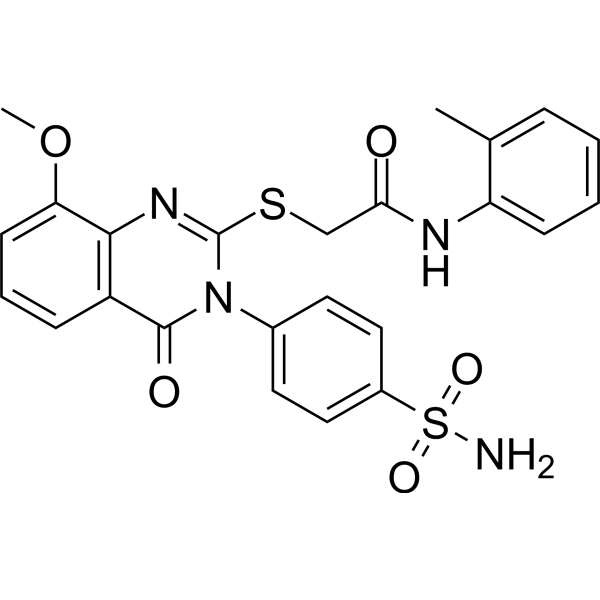
-
- HY-144791
-
|
|
Bcl-2 Family
MDM-2/p53
Caspase
Apoptosis
|
Cancer
|
|
Bcl-2-IN-6 (compound 10) is a potent Bcl-2 (B-cell lymphoma-2) inhibitor. Bcl-2-IN-7 down-regulates the expression of Bcl-2, and increases the expression of p53, Bax, and caspase-7 mRNA. Bcl-2-IN-7 induces cell cycle arrest and apoptosis in breast cancer MCF-7 cells. Bcl-2-IN-7 shows good anticancer activity, with IC50 values of 20.91, 22.30, 42.29, and 48.00 μM against MCF-7, LoVo, HepG2, and A549 cell lines, respectively .
|
-
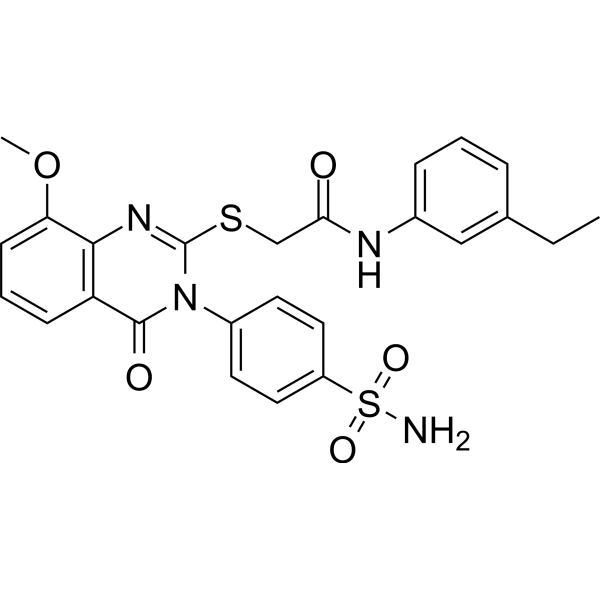
-
- HY-50907S
-
|
|
Biochemical Assay Reagents
|
Cancer
|
|
ABT 737-d8 is the deuterium labeled ABT-737. ABT-737, a BH3 mimetic, is a potent Bcl-2, Bcl-xL and Bcl-w inhibitor with EC50s of 30.3 nM, 78.7 nM, and 197.8 nM, respectively. ABT-737 induces the disruption of the BCL-2/BAX complex and BAK-dependent but BIM-independent activation of the intrinsic apoptotic pathway. ABT-737 induces autophagy and has the potential for acute myeloid leukemia (AML) research .
|
-
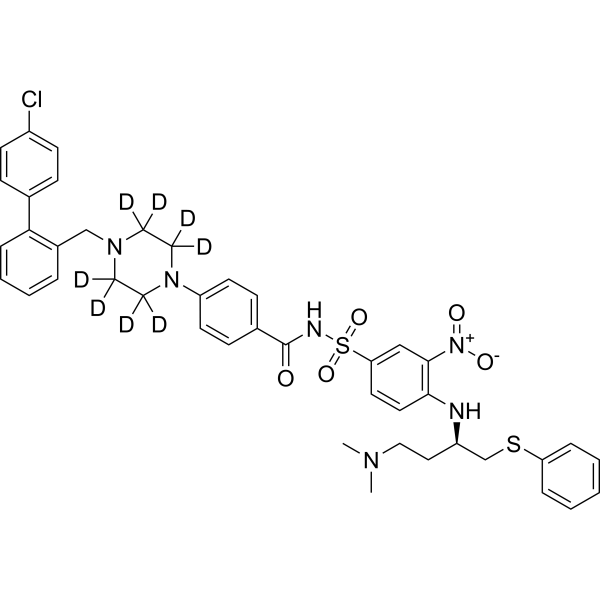
-
- HY-149918
-
|
|
Microtubule/Tubulin
Apoptosis
|
Cancer
|
|
Antiproliferative agent-23 is a microtubule-destabilizing agent (MDA) and efficiently disturbes the tubulin-microtubule system. Antiproliferative agent-23 induces apoptosis via a mitochondrion-dependent pathway by downregulating the Bcl-2 protein, upregulating Bax and Cyt c proteins, and activating the caspase cascade. Antiproliferative agent-23 initiates reactive oxygen species (ROS)-mediated endoplasmic reticulum stress in A549/CDDP cells (cisplatin resistant cancer cell line) via the PERK/ATF4/CHOP signaling pathway. Antiproliferative agent-23 has anti-tumor activity .
|
-
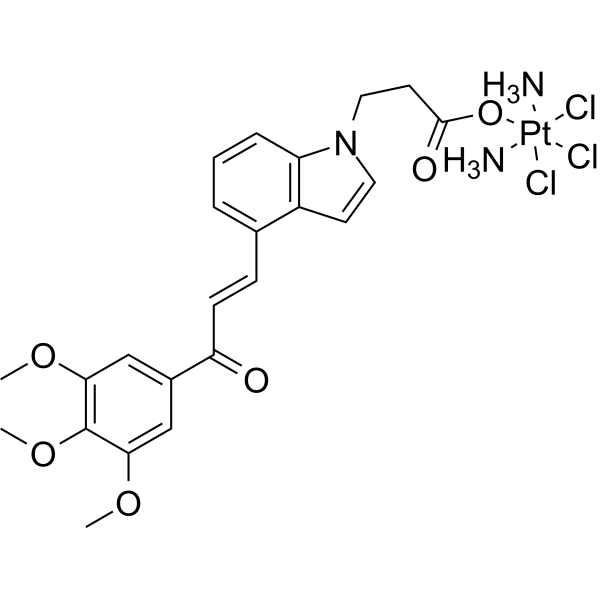
-
- HY-114310
-
|
|
VD/VDR
Apoptosis
|
Cancer
|
|
VDR agonist 1 (compound 28) is a nonsteroidal Vitamin D receptor (VDR) agonist, with an IC50 of 690 nM in MCF-7 cells. VDR agonist 1 arrests the cell cycle through the up-regulation of p21 and p27, promotes apoptosis by increasing the expression of BAX and decrease the expression of Bcl-2 .
|
-
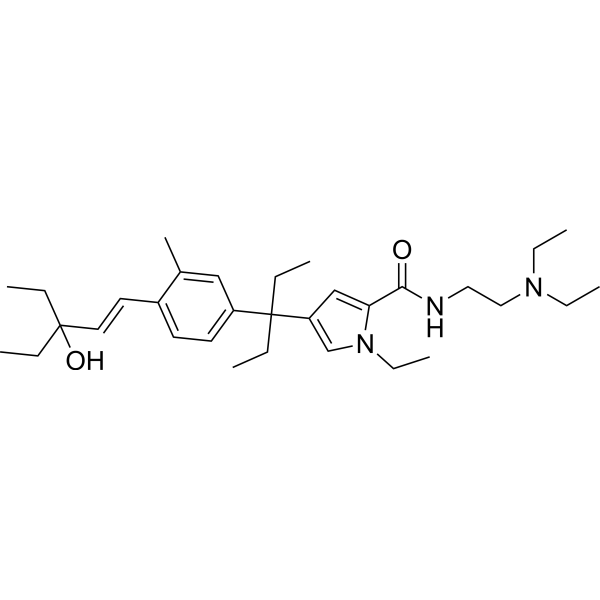
-
- HY-105930
-
|
D-19466
|
Apoptosis
Caspase
Bcl-2 Family
|
Cancer
|
|
Lobaplatin (D-19466) is a diastereometric mixture of platinum(II) complexe. Lobaplatin arrests cell cycle at G1 and G2/M phase. Lobaplatin induces apoptosis by increasing expressions of caspase and Bax, decreasing expression of Bcl-2. Lobaplatin can be used for research of cancer .
|
-
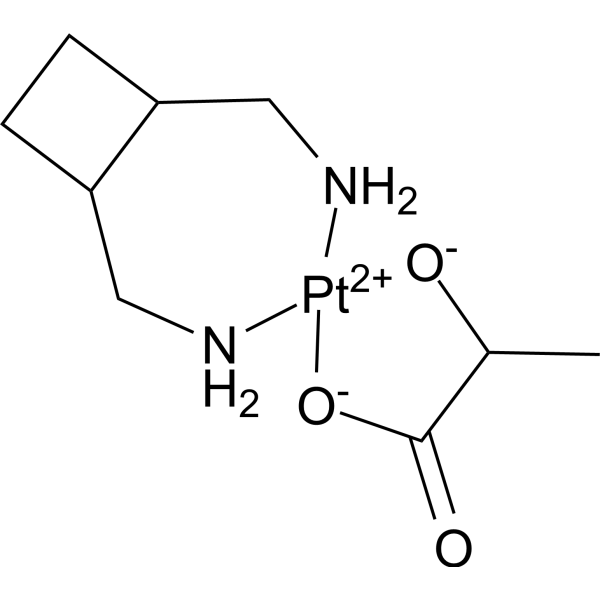
-
- HY-118119
-
|
|
PGE synthase
|
Cancer
|
|
CAY10526 is a specific microsomal PGE2 synthase-1 (mPGES1) inhibitor. CAY10526 inhibits PGE2 production through the selective modulation of mPGES1 expression but does not affect COX-2. CAY10526 significantly suppresses tumor growth and increases apoptosis in melanoma xenografts. CAY10526 reduces BCL-2 and BCL-XL (anti-apoptotic) protein levels and increases BAX and BAK (pro-apoptotic) as well as cleaved caspase 3 levels. CAY10526 inhibits cell viability (IC50<5 μM) in three melanoma cell lines expressing mPGES1 .
|
-
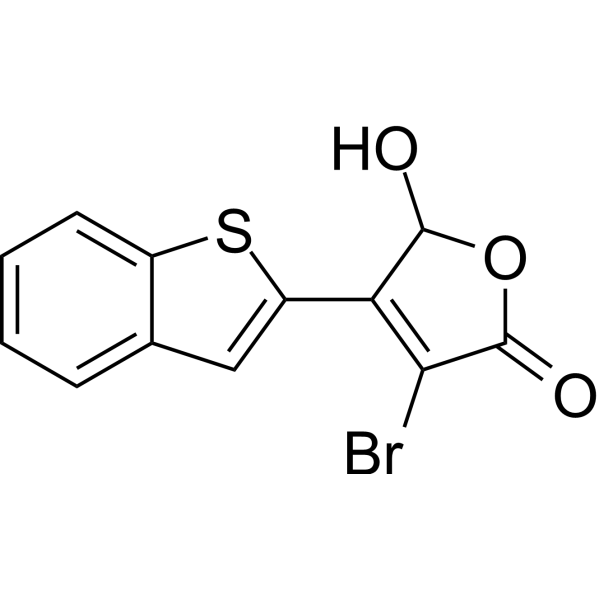
-
- HY-N2342
-
|
PCC1
|
|
|
|
Procyanidin C1 (PCC1), a natural polyphenol with oral activity, causes DNA damage, cell cycle arrest and induces apoptosis. Procyanidin C1 decreases the level of Bcl-2, but enhances BAX, caspase 3 and 9 expression in cancer cells. Procyanidin C1 shows senotherapeutic activity and increases lifespan in mice .
|
-
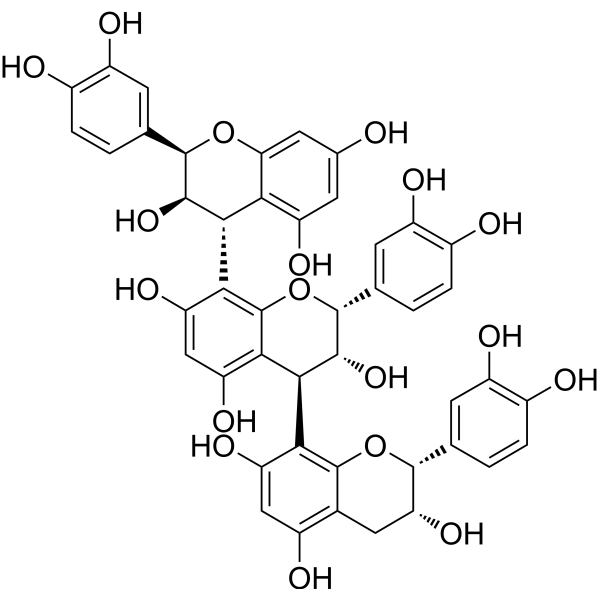
-
- HY-N1930
-
|
Hinesol
|
|
|
|
(-)-Hinesol (Hinesol) is a potent anticancer agent. (-)-Hinesol induces apoptosis and cell cycle arrest at G0/G1 phase. (-)-Hinesol downregulates MEK/ERK pathway and NF-κB pathway and mediates theexpression of cyclin D1, Bax and Bcl-2. (-)-Hinesol has the potential for the research of non–small cell lung cancer .
|
-
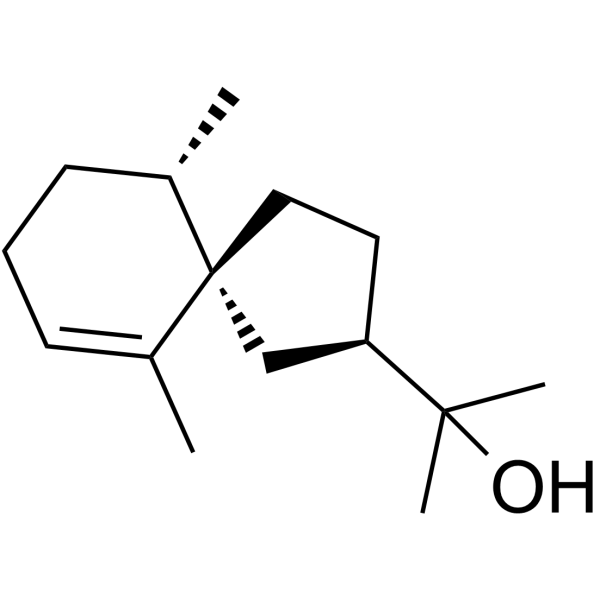
-
- HY-113471A
-
|
|
Apoptosis
Bacterial
|
Infection
Cancer
|
|
(S)-(-)-Perillic acid is a terpenoid plant extract with antimicrobial and anticancer activities. (S)-(-)-Perillic acid induces cell apoptosis and cell cycle arrest, and increases the levell of Bax, Bcl2, p21 and caspase-3 proteins. (S)-(-)-Perillic acid can be used for cancer and infection research .
|
-
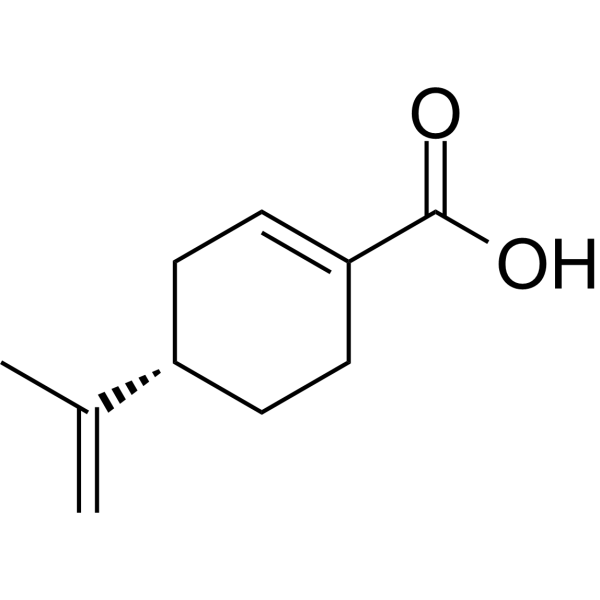
-
- HY-N0361
-
-
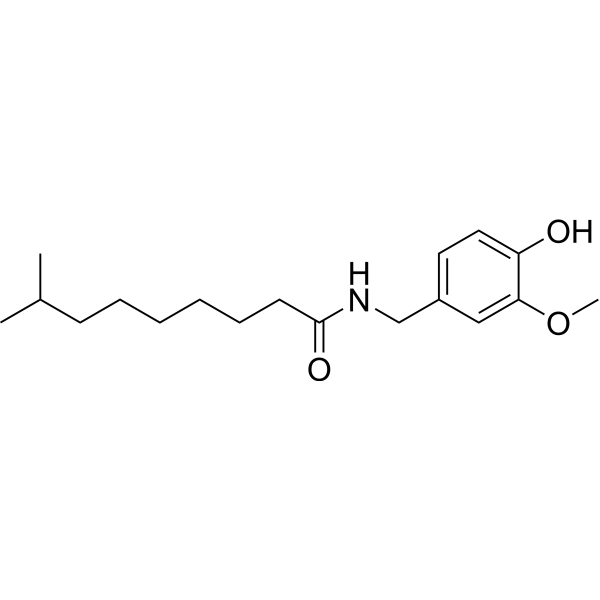
-
- HY-157176
-
|
|
Others
|
Others
|
|
BAX-IN-1 is a potential, selective inhibitor of Bcl-2-associated X protein (BAX).
|
-
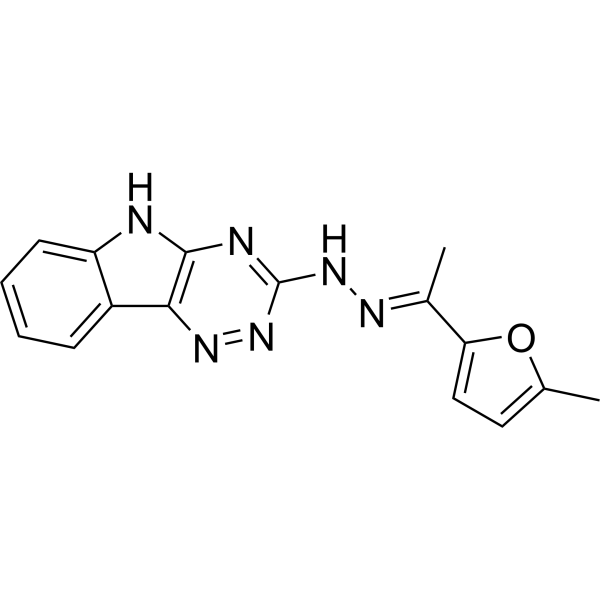
-
- HY-N0674A
-
|
13-Methylpalmatine chloride
|
Bcl-2 Family
Caspase
PARP
p38 MAPK
Parasite
Autophagy
|
Infection
Cancer
|
|
Dehydrocorydaline chloride (13-Methylpalmatine chloride) is an alkaloid that regulates protein expression of Bax, Bcl-2; activates caspase-7, caspase-8, and inactivates PARP . Dehydrocorydaline chloride elevates p38 MAPK activation. Anti-inflammatory and anti-cancer activities . Dehydrocorydaline chloride shows strong anti-malarial effects (IC50 =38 nM), and low cytotoxicity (cell viability > 90%) using P. falciparum 3D7 strain .
|
-
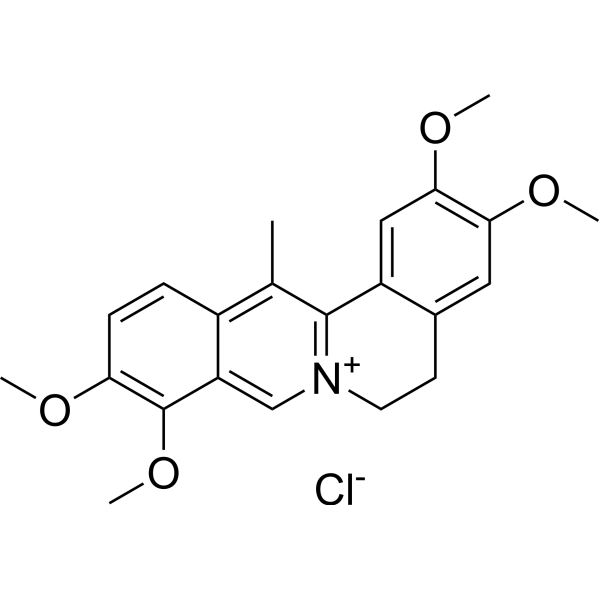
-
- HY-N0674
-
|
13-Methylpalmatine
|
Bcl-2 Family
Caspase
PARP
p38 MAPK
Parasite
Autophagy
|
Infection
Cancer
|
|
Dehydrocorydaline (13-Methylpalmatine) is an alkaloid that regulates protein expression of Bax, Bcl-2; activates caspase-7, caspase-8, and inactivates PARP . Dehydrocorydaline elevates p38 MAPK activation. Anti-inflammatory and anti-cancer activities . Dehydrocorydaline shows strong anti-malarial effects (IC50=38 nM), and low cytotoxicity (cell viability > 90%) using P. falciparum 3D7 strain .
|
-
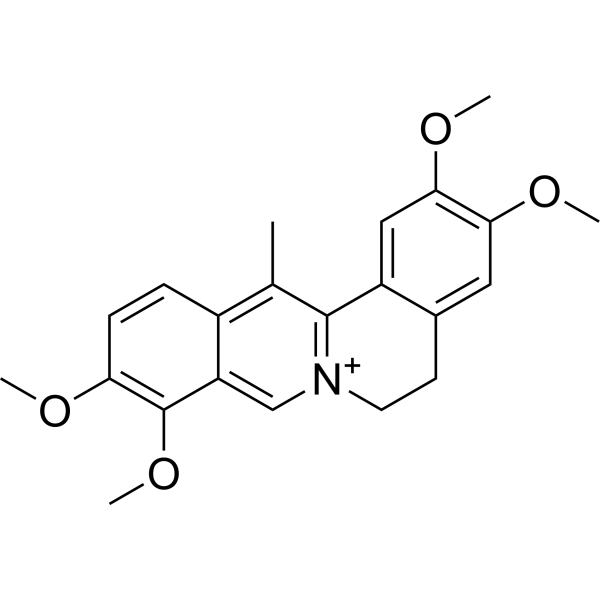
-
- HY-115974
-
|
|
Others
|
Cancer
|
|
GRPR antagonist-1 is a potent gastrin releasing peptide receptor (GRPR) antagonist, having the cytotoxicity against certain cancer cells (IC50 of 4.97, 4.36 and 3.40 μM in PC3, Pan02 and HGC-27 cells, respectively). GRPR antagonist-1 inhibits HGC-27 cell viability by decreasing the Bcl-2 level and increasing the Bax level, causing apoptosis. Anticancer activity .
|
-
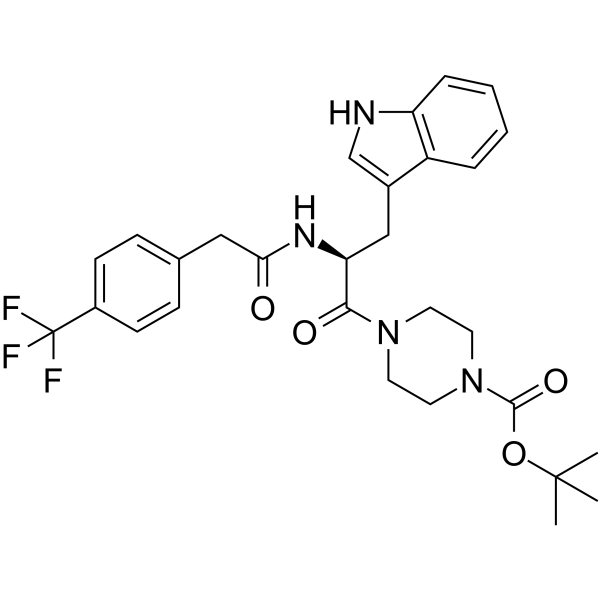
-
- HY-N0674B
-
|
13-Methylpalmatine (hydroxyl)
|
Bcl-2 Family
Caspase
PARP
p38 MAPK
Parasite
Autophagy
|
Infection
Inflammation/Immunology
Cancer
|
|
Dehydrocorydaline (13-Methylpalmatine) hydroxyl is an alkaloid that regulates protein expression of Bax, Bcl-2; activates caspase-7, caspase-8, and inactivates PARP. Dehydrocorydaline hydroxyl elevates p38 MAPK activation. Anti-inflammatory and anti-cancer activities. Dehydrocorydaline hydroxyl shows strong anti-malarial effects (IC50=38 nM), and low cytotoxicity (cell viability > 90%) using P. falciparum 3D7 strain.
|
-
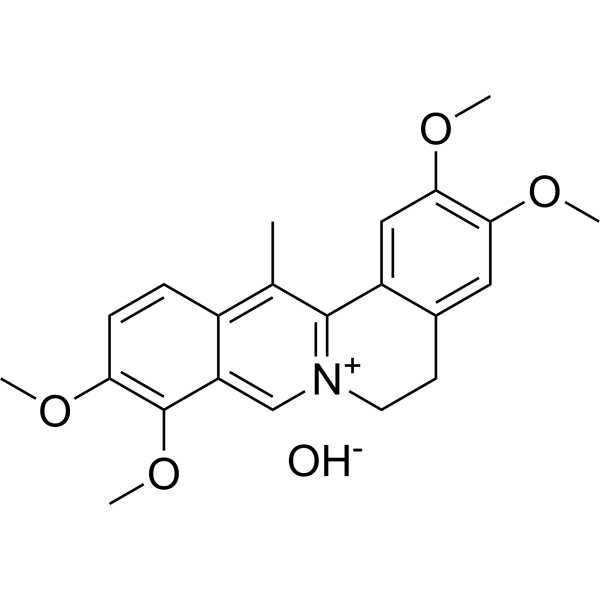
-
- HY-155242
-
|
|
VEGFR
Bcl-2 Family
Apoptosis
|
Cancer
|
|
VEGFR-2-IN-36 (compound 15) is a VEGFR-2 inhibitor (IC50: 0.067 μM) and inducer of apoptosis with anticancer activity. VEGFR-2-IN-36 upregulates BAX levels and downregulates Bcl-2 levels. VEGFR-2-IN-36 is toxic to cancer cells, MCF-7 (IC50=0.42 μM) and HepG2 (IC50=0.22 μM) .
|
-
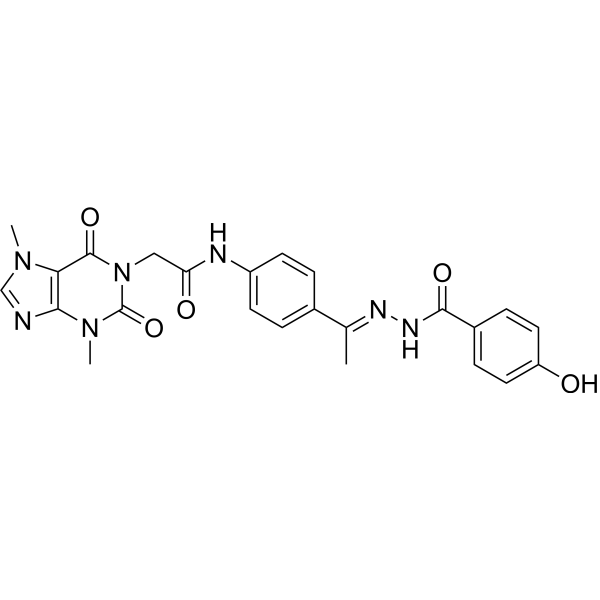
-
- HY-N0292
-
|
|
Cytochrome P450
PPAR
Apoptosis
|
Cardiovascular Disease
Inflammation/Immunology
Cancer
|
|
Oleuropein, found in olive leaves and oil, exerts antioxidant, anti-inflammatory and anti-atherogenic effects through direct inhibition of PPARγ transcriptional activity . Oleuropein induces apoptosis in breast cancer cells via the p53-dependent pathway and through the regulation of Bax and Bcl2 genes. Oleuropein also inhibits aromatase .
|
-
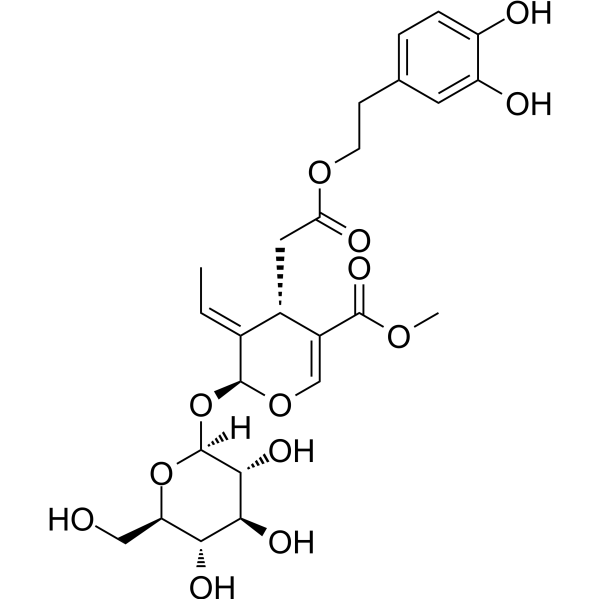
-
- HY-N4238
-
|
13-Methylpalmatine nitrate
|
Bcl-2 Family
Caspase
PARP
p38 MAPK
Parasite
Autophagy
|
Infection
Cancer
|
|
Dehydrocorydaline nitrate (13-Methylpalmatine nitrate) is an alkaloid. Dehydrocorydaline regulates protein expression of Bax, Bcl-2; activates caspase-7, caspase-8, and inactivates PARP . Dehydrocorydaline nitrate elevates p38 MAPK activation. Anti-inflammatory and anti-cancer activities. . Dehydrocorydaline nitrate shows strong anti-malarial effects (IC50 =38 nM), and low cytotoxicity (cell viability > 90%) using P. falciparum 3D7 strain .
|
-
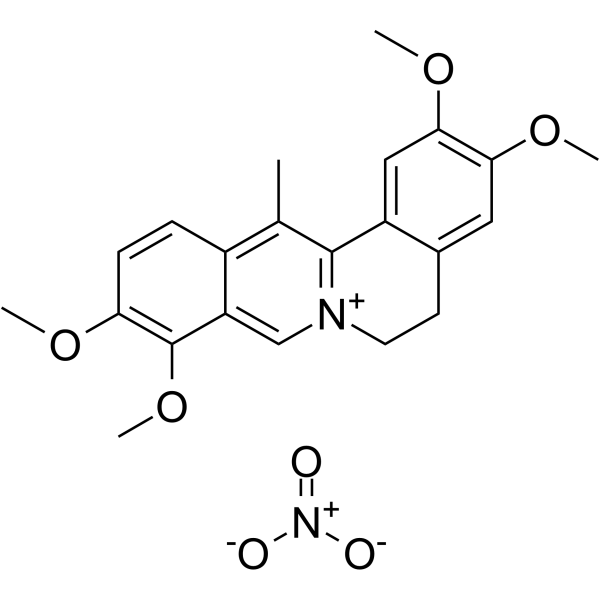
-
- HY-146444
-
|
|
Apoptosis
Bcl-2 Family
Caspase
Reactive Oxygen Species
|
Cancer
|
|
Anticancer agent 56 (compound 4d) is a potent anti-cancer agent with agent-likeness properties, possessing anticancer activity against several cancer cell lines (IC50<3 μM). Anticancer agent 56 induces cell cycle arrest at G2/M phase and triggers mitochondrial apoptosis pathway. Anticancer agent 56 acts by accumulation of ROS, up regulation of BAX, down regulation of Bcl-2 and activation of caspases 3, 7, 9 .
|
-
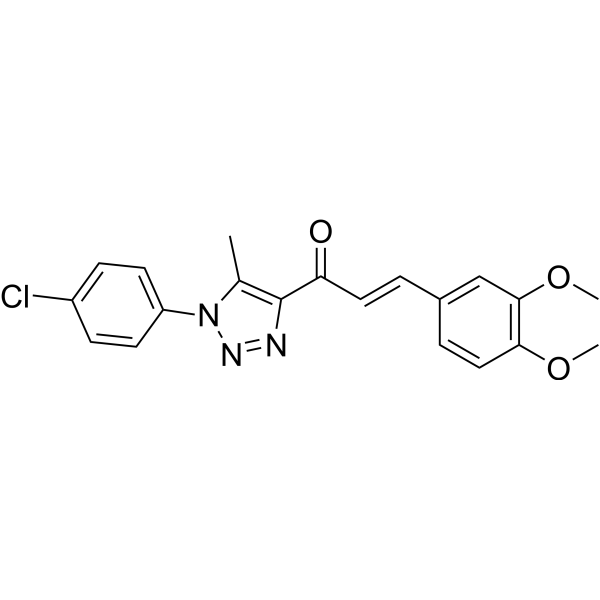
-
- HY-N0361S
-
|
|
Isotope-Labeled Compounds
|
Others
|
|
Dihydrocapsaicin-d3is the deuterium labeledDihydrocapsaicin(HY-N0361) . Dihydrocapsaicin, a capsaicin, is a potent and selective TRPV1 (transient receptor potential vanilloid channel 1) agonist. Dihydrocapsaicin reduces AIF, Bax, and Caspase-3 expressions, and increased Bcl-2, Bcl-xL and p-Akt levels. Dihydrocapsaicin enhances the hypothermia-induced neuroprotection following ischemic stroke via PI3K/Akt regulation in rat .
|
-
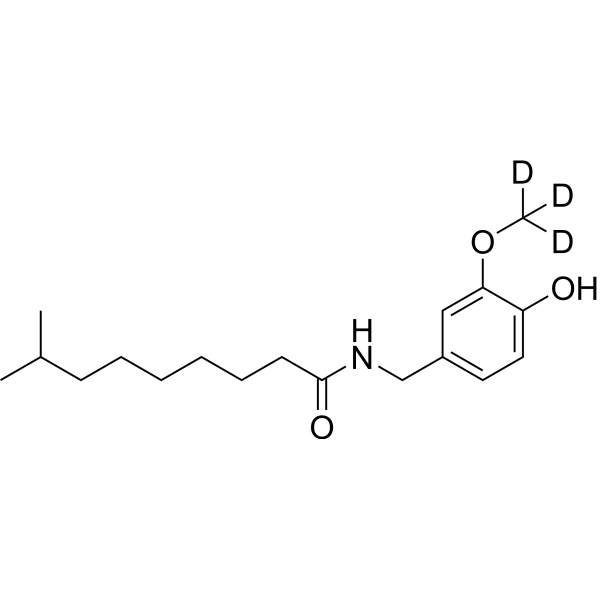
-
- HY-145288
-
|
|
Apoptosis
|
Cancer
|
|
Antitumor agent-36 possesses potent anti-proliferative and anti-metastasis activities. Antitumor agent-36 induces serious DNA damage and further leads to high expression of γ-H2AX and p53. Antitumor agent-36 promotes apoptosis of tumor cells through mitochondrial apoptotic pathway Bcl-2/Bax/caspase3. Antitumor agent-36 significantly improves immune response through restraining the expression of PD-L1 to increase CD3+ and CD8+ T infiltrating cells in tumor tissues .
|
-
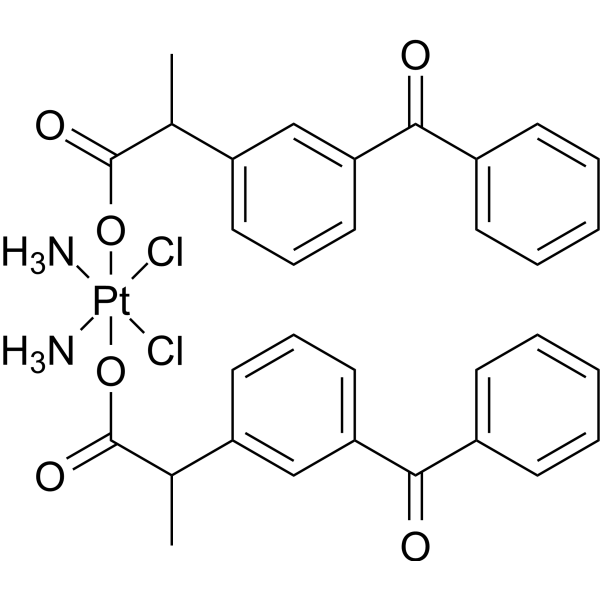
-
- HY-145289
-
|
|
Apoptosis
|
Cancer
|
|
Antitumor agent-37 possesses potent anti-proliferative and anti-metastasis activities. Antitumor agent-37 induces serious DNA damage and further leads to high expression of γ-H2AX and p53. Antitumor agent-37 promotes apoptosis of tumor cells through mitochondrial apoptotic pathway Bcl-2/Bax/caspase3. Antitumor agent-37 significantly improves immune response through restraining the expression of PD-L1 to increase CD3+ and CD8+ T infiltrating cells in tumor tissues .
|
-
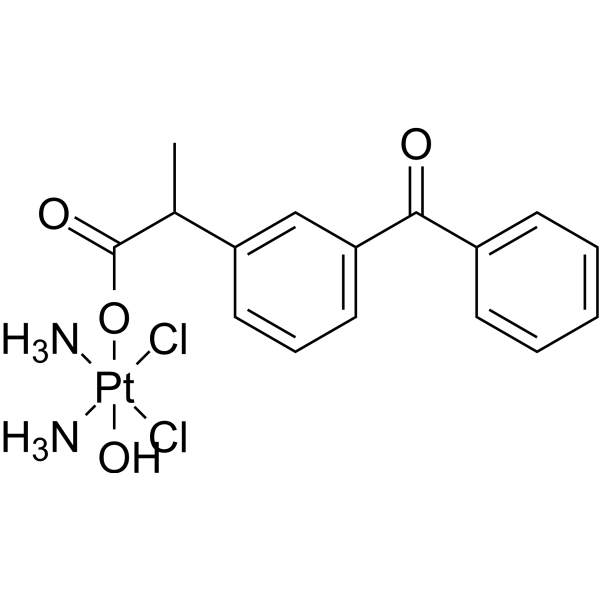
-
- HY-146253
-
|
|
CDK
Apoptosis
Bcl-2 Family
Caspase
|
Cancer
|
|
CDK1/2/4-IN-1 (compound 3a) is a potent CDK inhibitor with IC50 values of 1.47, 0.78 and 0.87 μM for CDK1, CDK2 and CDK4, respectively. CDK1/2/4-IN-1 arrests cell cycle at G2/M phase and induces apoptosis. CDK1/2/4-IN-1 elevates Bax, caspase-3, P53 levels and decreases Bcl-2 level. CDK1/2/4-IN-1 can be used for cancer research .
|
-
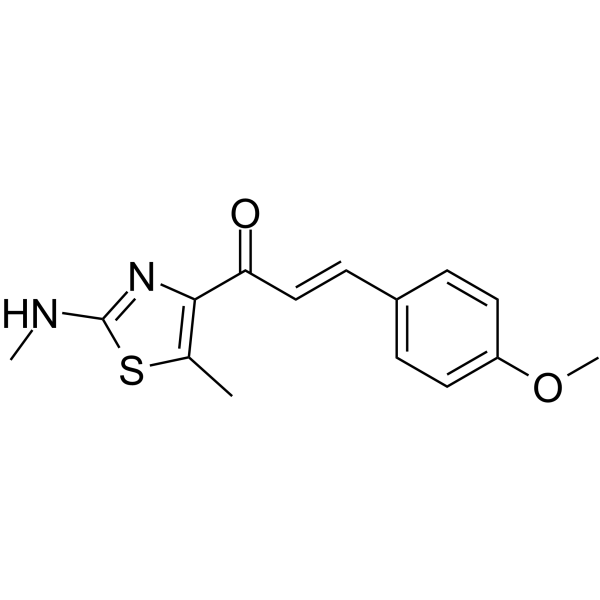
-
- HY-162148
-
|
|
EGFR
|
Cancer
|
|
HNPMI is an inhibitor of EGFR and has cytotoxic effects on tumor cells. HNPMI can downregulate the protein levels of osteopontin, survivin and cathepsin S, leading to apoptosis. HNPMI also regulates BCL-2/BAX and p53 in CRC cell lines to inhibit tumorigenesis .
|
-
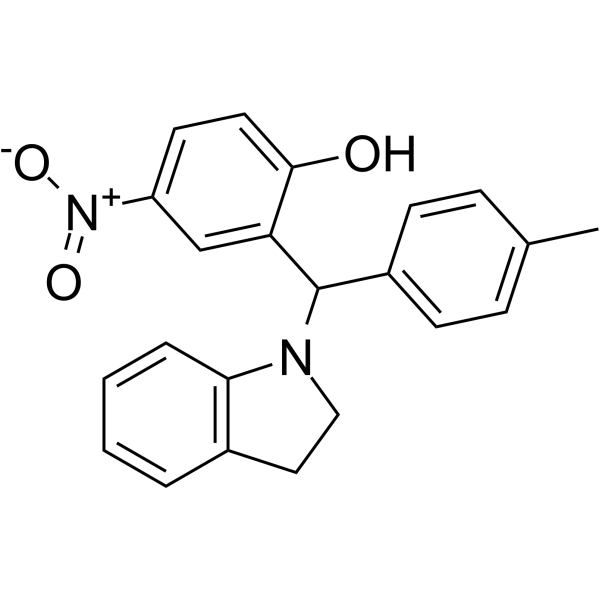
-
- HY-111329
-
|
ILS-JGB-1741
|
Sirtuin
Apoptosis
|
Cancer
|
|
JGB1741 (ILS-JGB-1741) is a potent and specific SIRT1 activity inhibitor with an IC50 of ∼15 μM. JGB1741 is a weak SIRT2 and SIRT3 inhibitor with an all IC50>100 μM. JGB1741 increases the acetylated p53 levels leading to p53-mediated apoptosis with modulation of Bax/Bcl2 ratio, cytochrome c release and PARP cleavage. JGB1741 has the potential for breast cancer research .
|
-
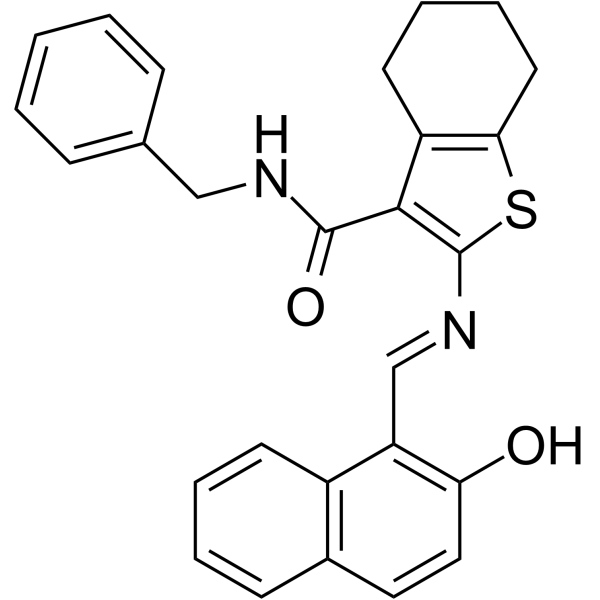
-
- HY-N3584
-
|
Chonglou Saponin VII
|
Akt
p38 MAPK
P-glycoprotein
Bcl-2 Family
Caspase
PARP
Autophagy
Apoptosis
|
Cancer
|
|
Paris saponin VII (Chonglou Saponin VII) is a steroidal saponin isolated from the roots and rhizomes of Trillium tschonoskii. Paris saponin VII-induced apoptosis in K562/ADR cells is associated with Akt/MAPK and the inhibition of P-gp. Paris saponin VII attenuates mitochondrial membrane potential, increases the expression of apoptosis-related proteins, such as Bax and cytochrome c, and decreases the protein expression levels of Bcl-2, caspase-9, caspase-3, PARP-1, and p-Akt. Paris saponin VII induces a robust autophagy in K562/ADR cells and provides a biochemical basis in the treatment of leukemia .
|
-
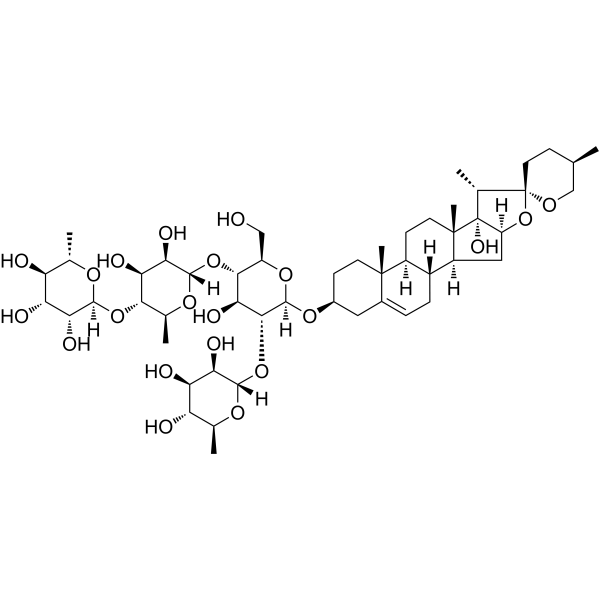
-
- HY-161100
-
|
|
Apoptosis
|
Cancer
|
|
BDM19 binds and activates cytosolic BAX dimers, and prompts cell apoptosis either alone or in combination with BCL-2/BCL-XL inhibitor Navitoclax (HY-10087) .
|
-
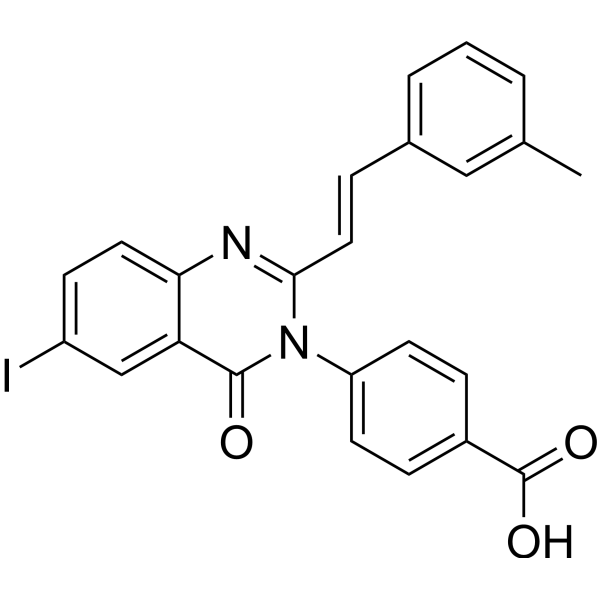
-
- HY-144778
-
|
|
Indoleamine 2,3-Dioxygenase (IDO)
Apoptosis
Bcl-2 Family
|
Cancer
|
|
IDO1/TDO-IN-1 (30) is a potent dual IDO1 (uncompetitive, Ki of 0.23 μM) and TDO (competitive, Ki of 0.73 μM) inhibitor. IDO1/TDO-IN-1 (30) significantly promotes cell apoptosis through the potential mitochondria-mediated Bcl-2/Bax pathway .
|
-
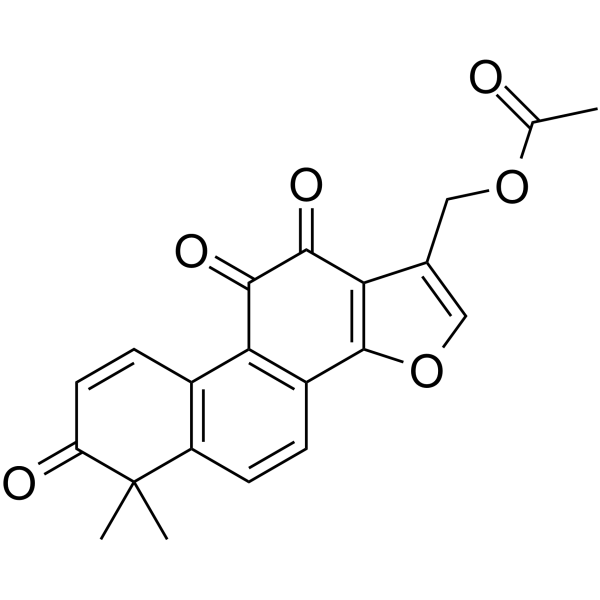
-
- HY-N0265
-
|
|
Caspase
Apoptosis
|
Cardiovascular Disease
|
|
Asperosaponin VI, A saponin component from Dipsacus asper, induces osteoblast differentiation through BMP‐2/p38 and ERK1/2 pathway . Asperosaponin Ⅵ inhibits apoptosis in hypoxia-induced cardiomyocyte by increasing the Bcl-2/Bax ratio and decreasing active caspase-3 expression, as well as enhancing of p-Akt and p-CREB .
|
-
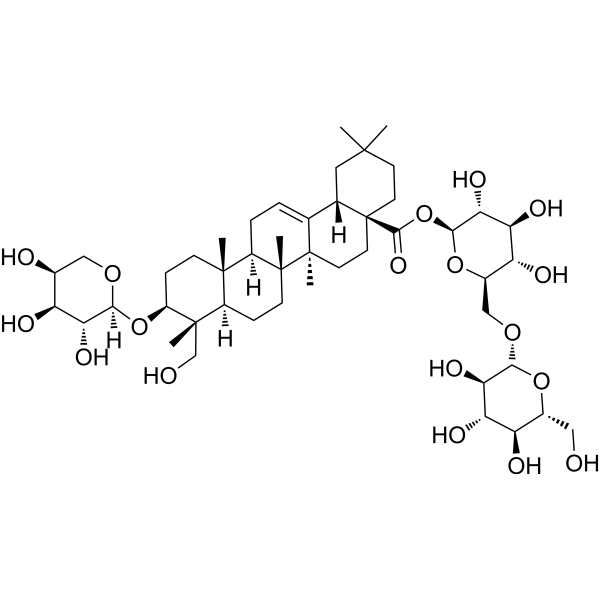
-
- HY-143235
-
|
|
Epigenetic Reader Domain
Apoptosis
Bcl-2 Family
Caspase
c-Myc
|
Cancer
|
|
BRD4 Inhibitor-15 (compound 13) is a potent BRD4 inhibitor, with an IC50 of 18 nM. BRD4 Inhibitor-15 induces apoptosis of 22RV1 cells by regulating Bcl-2/Bax proteins and activating caspase-3 signaling pathway. BRD4 Inhibitor-15 down-regulates the c-Myc level in 22RV1 cells. BRD4 Inhibitor-15 can be used for prostate cancer research .
|
-
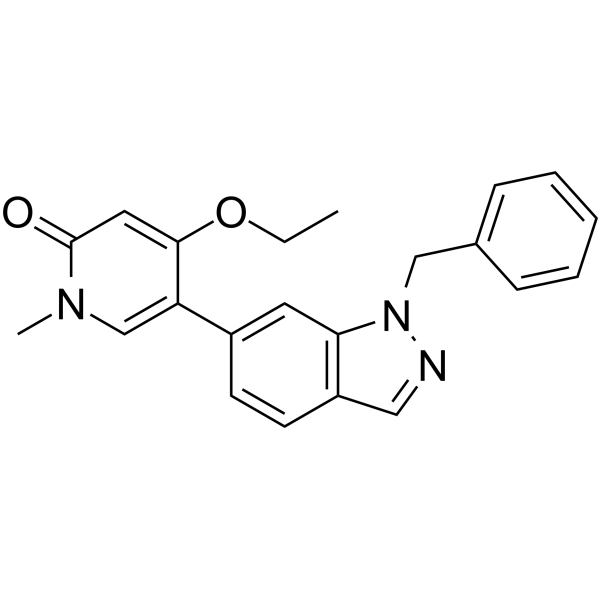
-
- HY-N2638
-
|
|
Apoptosis
|
Cardiovascular Disease
|
|
Ilexsaponin A, isolated from the root of Ilex pubescens, attenuates ischemia-reperfusion-induced myocardial injury through anti-apoptotic pathway. Ilexsaponin A can reduce myocardial infarct size, lower the serum levels of LDH, AST and CK-MB, increase cellular viability and inhibit apoptosis in hypoxia/reoxygenation cardiomyocytes .
|
-
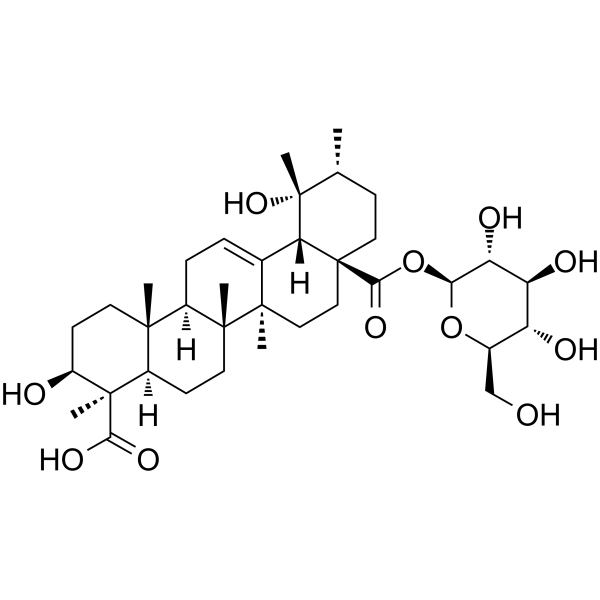
-
- HY-103271
-
|
|
Bcl-2 Family
|
Cancer
|
|
Bax inhibitor peptide, negative control is a inhibitor of Bax. Bax inhibitor peptide, negative control inhibits Bax translocation to mitochondria and Bax-mediated apoptosis in vitro .
|
-
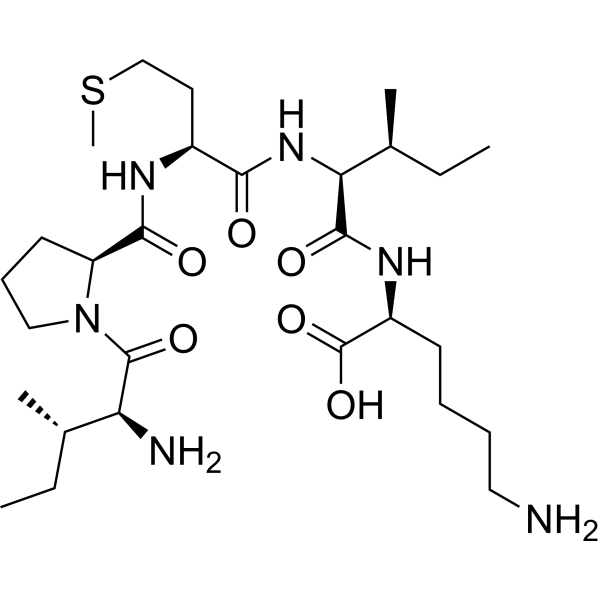
-
- HY-163077
-
|
|
Reactive Oxygen Species
Apoptosis
|
Cancer
|
|
Anticancer agent 175 (complex 1) ia a near-infrared (NIR) luminescent theranostic complex. Anticancer agent 175 induces ROS accumulation, mitochondrial damage, disruption of Bax/Bcl-2 equilibrium, and tumor cell apoptosis in HepG2 cell line .
|
-
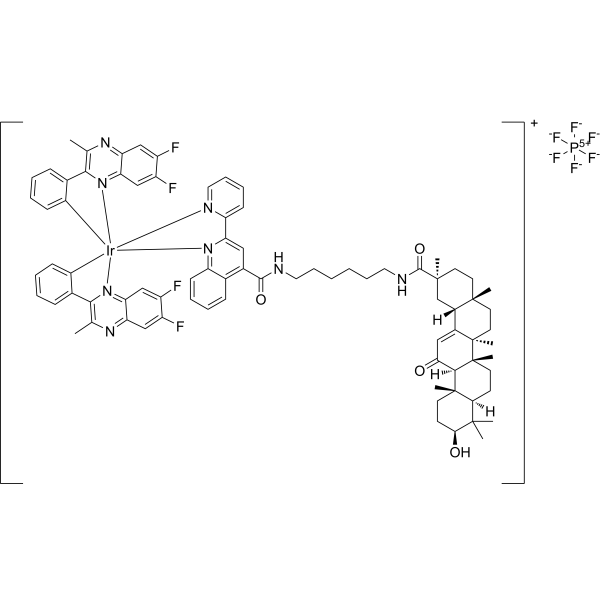
-
- HY-B1060
-
|
Methylprednisolone hydrogen succinate sodium
|
Glucocorticoid Receptor
|
Inflammation/Immunology
|
|
Methylprednisolone succinate (Methylprednisolone hydrogen succinate) sodium, a glucocorticoid, is a immunosuppressive agent with anti-inflammatory effects .
|
-
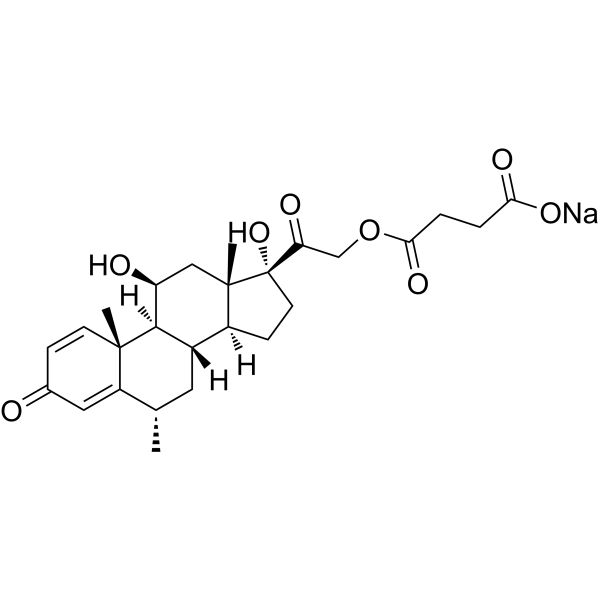
-
- HY-P3993
-
|
14-Glycine-Humanin (human)
|
Apoptosis
|
Neurological Disease
|
|
(Gly14)-Humanin (human) (14-Glycine-Humanin (human)) is an analog of Humanin in which the 14th amino acid serine was replaced with glycine (Gly). (Gly14)-Humanin (human) has anti-apoptotic and neuroprotective functions .
|
-
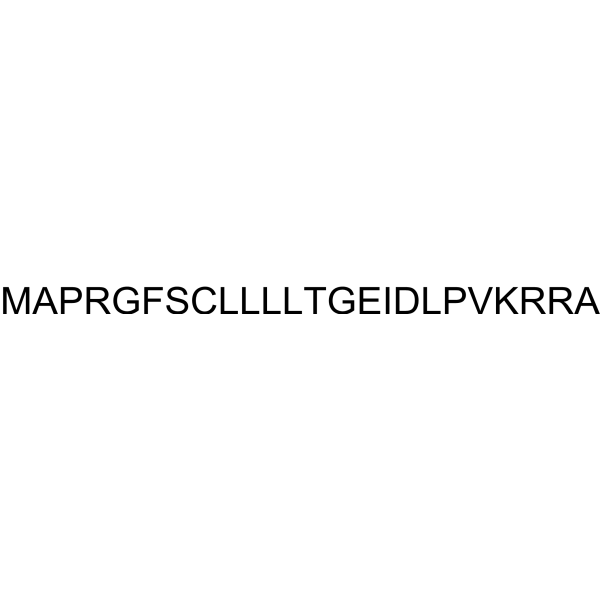
-
- HY-P3993A
-
|
14-Glycine-Humanin (human) (acetate)
|
Apoptosis
|
Neurological Disease
|
|
(Gly14)-Humanin (human) (14-Glycine-Humanin (human)) acetate is an analog of Humanin in which the 14th amino acid serine was replaced with glycine (Gly). (Gly14)-Humanin (human) acetate has anti-apoptotic and neuroprotective functions .
|
-
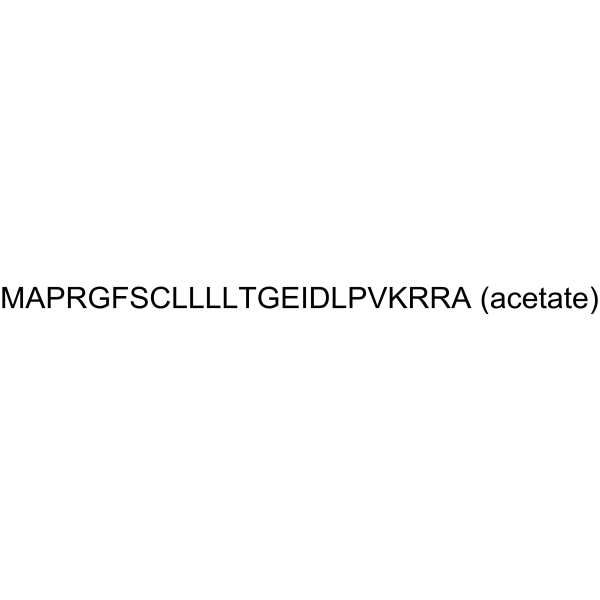
-
- HY-N1440
-
|
|
|
|
|
Koumine is an alkaloid separated from Gelsemium elegans, shows potent anti-tumor activity. Koumine up-regulates the Bax/Bcl-2 ratio and caspase-3 expression in human breast cancer cells . Koumine has anxiolytic, antistress, antipsoriatic, and analgesic activities , protects against the development of arthritis in Rheumatoid arthritis (RA) animal models .
|
-
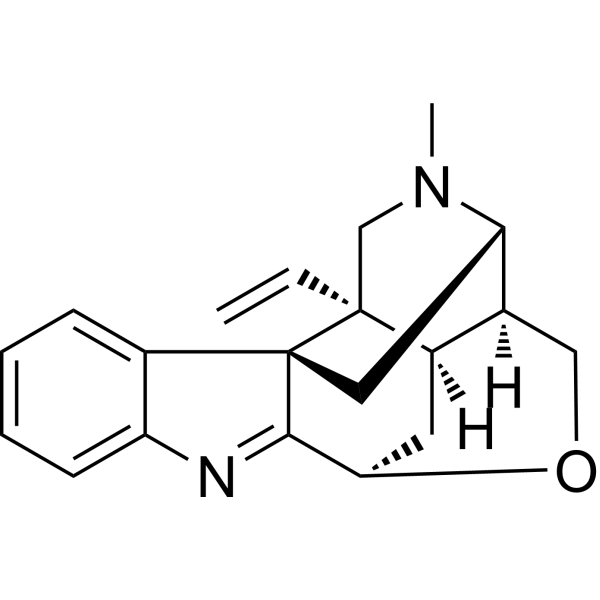
-
- HY-N0307
-
|
|
Bcl-2 Family
|
Neurological Disease
|
|
Ciwujianoside B is isolated from Eleutherococcus senticosus leaf, is able to penetrate and work in the brain after the oral administration. Ciwujianoside B significantly enhances object recognition memory .
Ciwujianoside B shows radioprotective effects on the hematopoietic system in mice, which is associated with changes in the cell cycle, reduces DNA damage and down-regulates the ratio of Bax/Bcl-2 in bone marrow cells exposed to radiation .
|
-
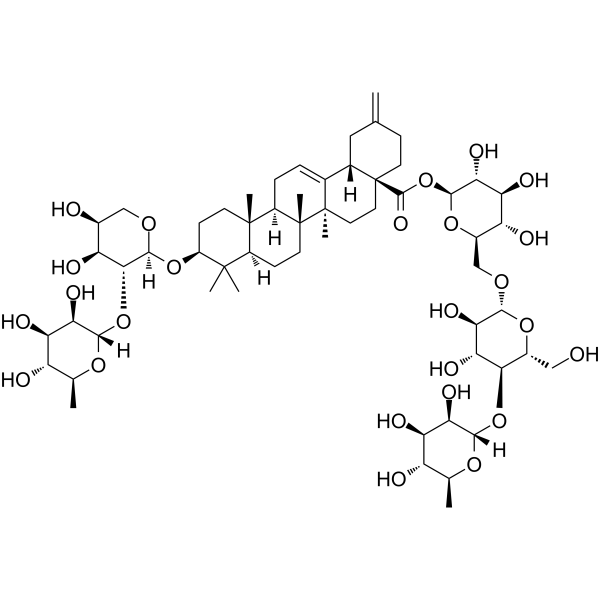
-
- HY-151428
-
|
|
Ferroptosis
Apoptosis
Bcl-2 Family
COX
|
Cancer
|
|
Antitumor agent-78 is an antitumor agent, inhibits cancer cells growth and migration. Antitumor agent-78 triggers ferroptosis by inhibiting GPx-4 and elevating COX2. Antitumor agent-78 also activates intrinsic apoptotic pathway (Bax-Bcl-2-caspase-3) and hinders Epithelial-mesenchymal transition (EMT) process of cancer cells .
|
-
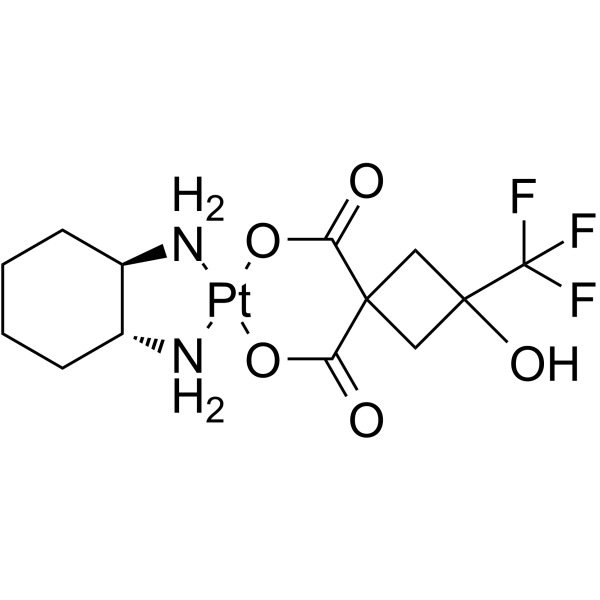
-
- HY-151429
-
|
|
Apoptosis
Ferroptosis
Bcl-2 Family
COX
|
Cancer
|
|
Antitumor agent-77 is an antitumor agent, inhibits cancer cells growth and migration. Antitumor agent-77 triggers ferroptosis by inhibiting GPx-4 and elevating COX2. Antitumor agent-77 also activates intrinsic apoptotic pathway (Bax-Bcl-2-caspase-3) and hinders Epithelial-mesenchymal transition (EMT) process of cancer cells .
|
-
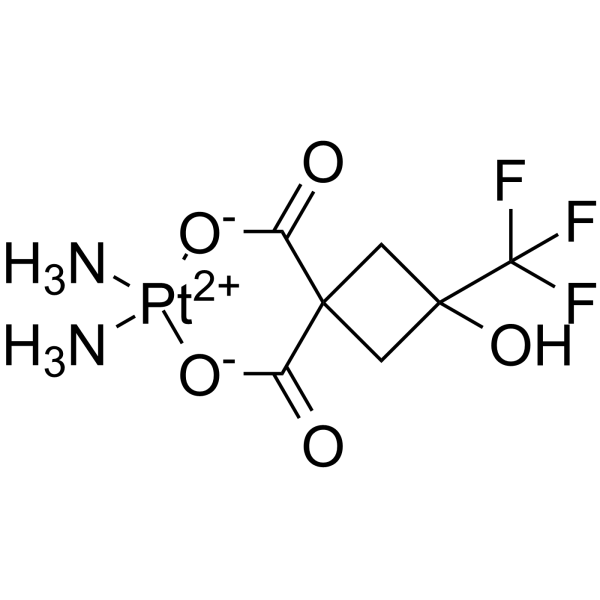
-
- HY-B1793
-
|
|
Potassium Channel
|
Neurological Disease
Cancer
|
|
Tetraethylammonium chloride is a non-selective potassium channel blocker. Tetraethylammonium chloride is a good substrate for organic cation transporter (OCTN1). Tetraethylammonium chloride antitumor properties .
|
-
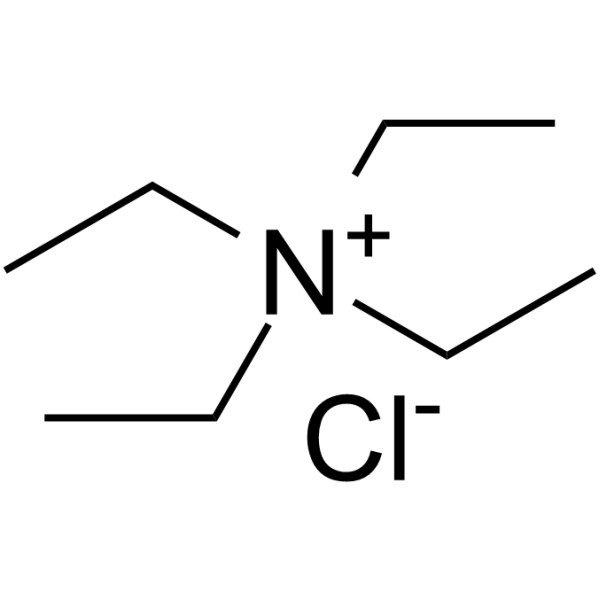
- HY-147872
-
|
|
VEGFR
Microtubule/Tubulin
Apoptosis
|
Cancer
|
|
VEGFR-2-IN-22 (Compound 25) is a dual VEGFR-2 and β-tubulin polymerization inhibitor with an IC50 of 19.82 nM against VEGFR-2. VEGFR-2-IN-22 induces apoptosis .
|
-
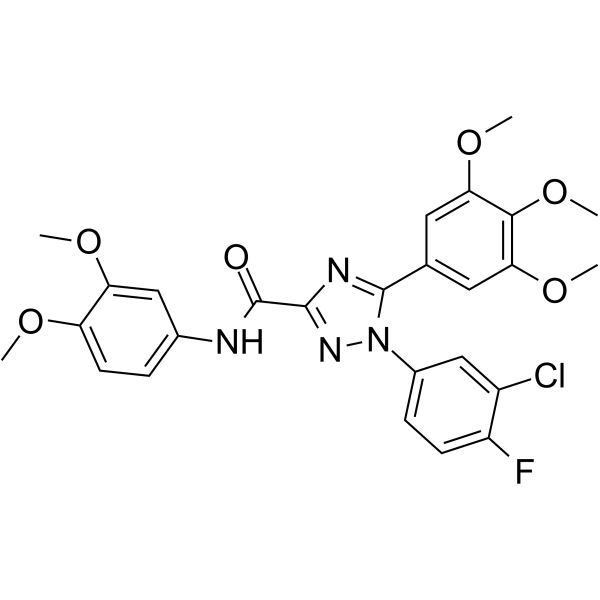
- HY-N10481
-
|
|
Apoptosis
Caspase
PARP
Bcl-2 Family
|
Cancer
|
|
Aviculin, a lignan glycoside, is a potent anticancer agent. Aviculin reduces metabolic activity on MCF-7 cells below 50%, with an IC50 of 75.47 μM. Aviculin induces breast cancer cell apoptosis through the intrinsic apoptosis pathway. Aviculin increases expression of initiator caspase-9, executioner caspase-7, and poly (ADP-ribose) polymerase (PARP). Aviculin shows an increase in the Bax/Bcl-2 ratio .
|
-
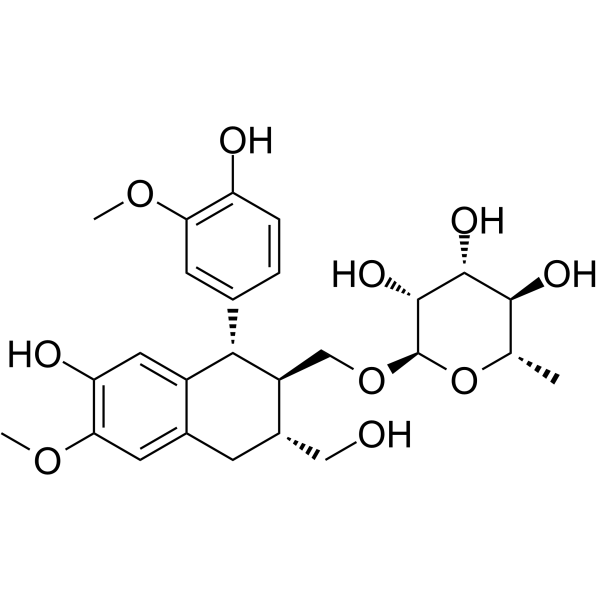
- HY-13735A
-
|
Mepacrine dihydrochloride; SN-390 dihydrochloride
|
Parasite
Apoptosis
Autophagy
Mitophagy
|
Infection
Cancer
|
|
Quinacrine (Mepacrine) dihydrochloride is an orally bioavailable antimalarial agent, which possess anticancer effect both in vitro and vivo. Quinacrine dihydrochloride suppresses NF-κB and activate p53 signaling, which results in the induction of the apoptosis .
|
-
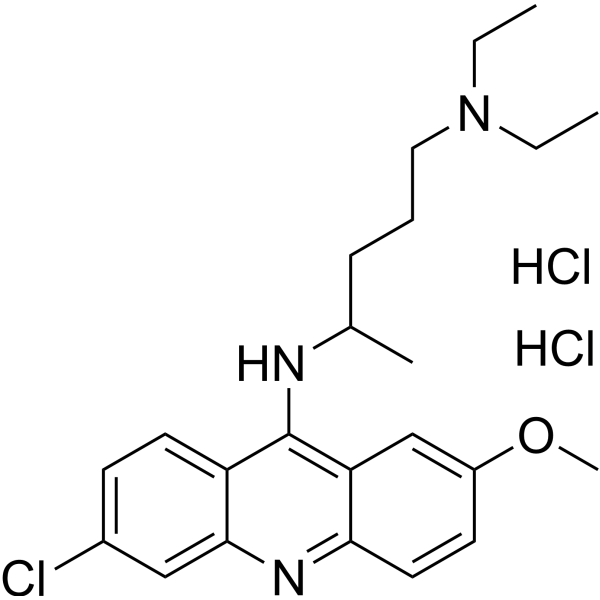
- HY-13735B
-
|
Mepacrine hydrochloride hydrate; SN-390 hydrochloride hydrate
|
Parasite
Apoptosis
Autophagy
Mitophagy
|
Infection
Cancer
|
|
Quinacrine hydrochloride hydrate (Mepacrine hydrochloride hydrate) is an antimalarial agent, which possess anticancer effect both in vitro and vivo. Quinacrine hydrochloride hydrate suppresses NF-κB and activates p53 signaling, which results in the induction of the apoptosis .
|
-
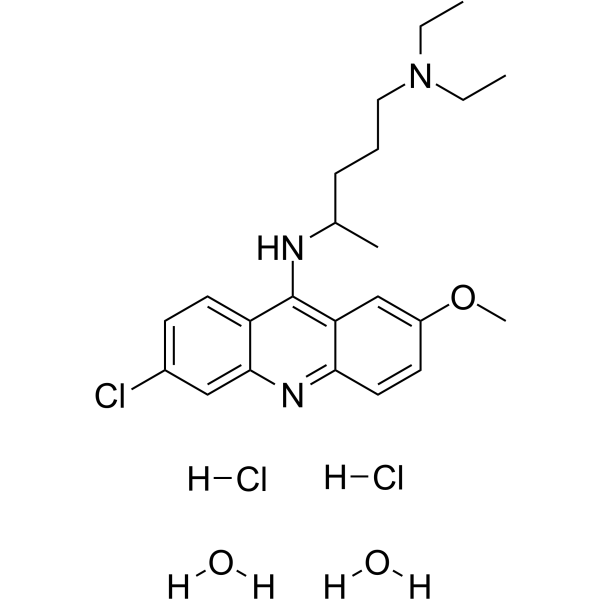
- HY-144805
-
|
|
VEGFR
Apoptosis
|
Cancer
|
|
VEGFR-2-IN-18 (Compound 15d) is a potent VEGFR-2 inhibitor with an IC50 of 60 nM. VEGFR-2-IN-18 induces cell apoptosis. VEGFR-2-IN-18 shows antitumor activities .
|
-
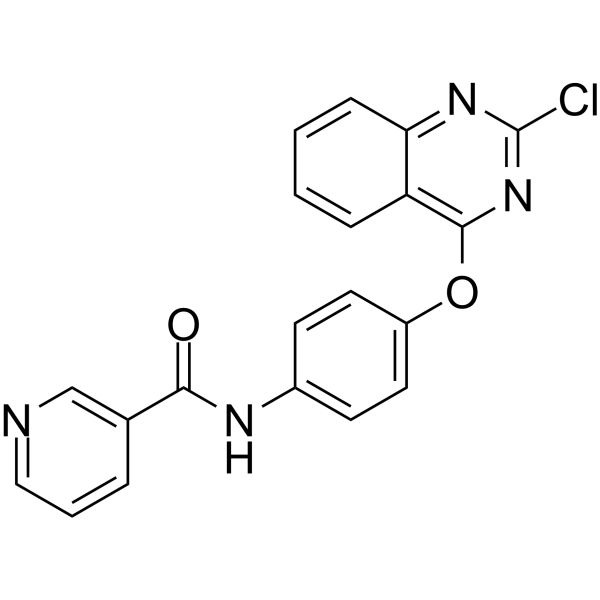
- HY-P0217
-
-
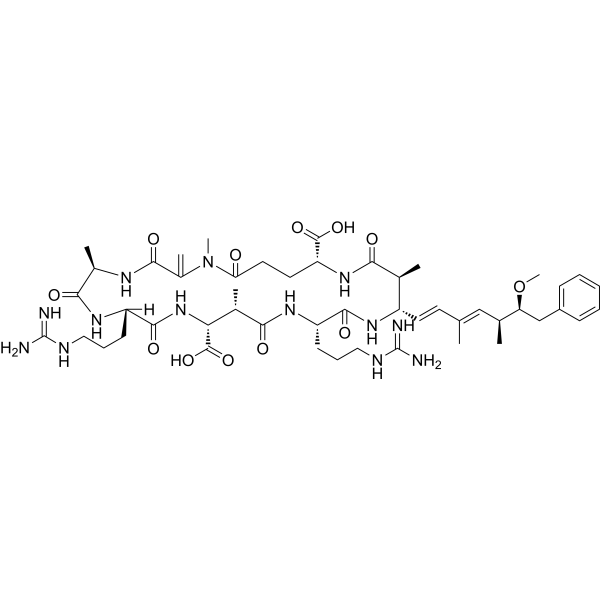
- HY-150596
-
|
|
Apoptosis
Bcl-2 Family
JNK
|
Cancer
|
|
CT1-3 is a potent anticancer agent. CT1-3 induces mitochondria-mediated apoptosis by regulating JNK/Bcl-2/Bax/XIAP pathway. CT1-3 suppresses the epithelial mesenchymal transition (EMT) potential of human cancer cells (HCCs) via regulating the E-cadherin/Snail axis, thus inhibits tumorigenesis. CT1-3 has a strong antitumor effect in mice model and exhibits no significant hepatic and renal toxicity .
|
-
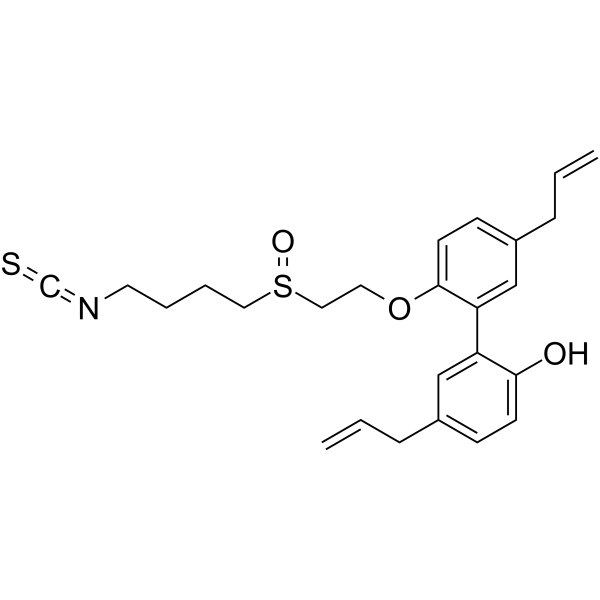
- HY-151443
-
|
|
HDAC
|
Cancer
|
|
HDAC-IN-47 is an orally active inhibitor of histone deacetylase (HDAC), with IC50s of 19.75 nM (HDAC1), 5.63 nM (HDAC2), 40.27 nM (HDAC3), 57.8 nM (HDAC2), 302.73 nM (HDAC8), respectively. HDAC-IN-47 inhibits autophagy and induces apoptosis via the Bax/Bcl-2 and caspase-3 pathways. HDAC-IN-47 arrests cell cycle at G2/M phase, and shows anti-tumor efficacy in vivo .
|
-
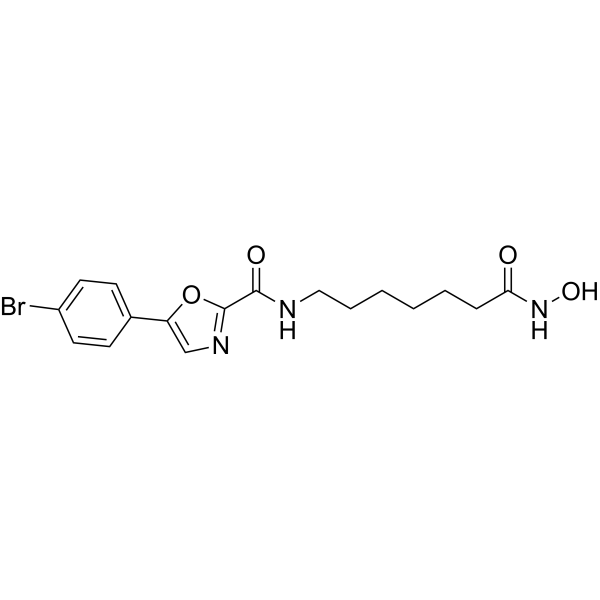
- HY-131503
-
|
13-MTD; 13-Methylmyristic acid
|
Apoptosis
|
Cancer
|
|
13-Methyltetradecanoic acid (13-MTD), a saturated branched-chain fatty acid with potent anticancer effects. 13-Methyltetradecanoic acid induces apoptosis in many types of human cancer cells .
|
-
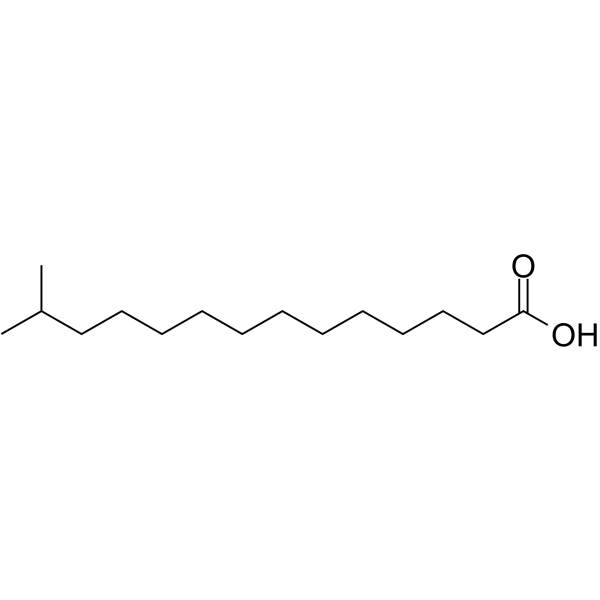
- HY-144754
-
|
|
VEGFR
Apoptosis
|
Cancer
|
|
VEGFR-2-IN-13 (Compound 19a) is a potent VEGFR-2 inhibitor with an IC50 of 3.4 nM. VEGFR-2-IN-13 disrupts the HepG2 cell cycle by arresting the G2/M phase and induces apoptosis .
|
-
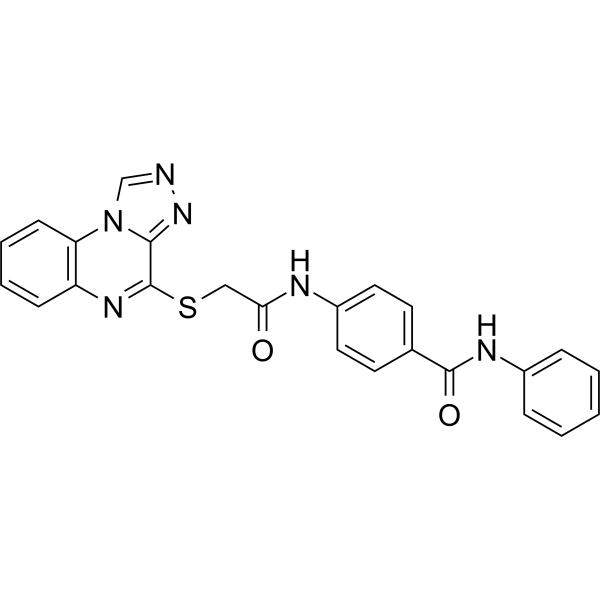
- HY-146255
-
|
|
Apoptosis
|
Cancer
|
|
Apoptosis inducer 10 is a potent apoptosis inducer. Apoptosis inducer 10 shows antiproliferative effect. Apoptosis inducer 10 induces apoptosis in HeLa cancer cells via a mitochondria-dependent endogenous pathway .
|
-
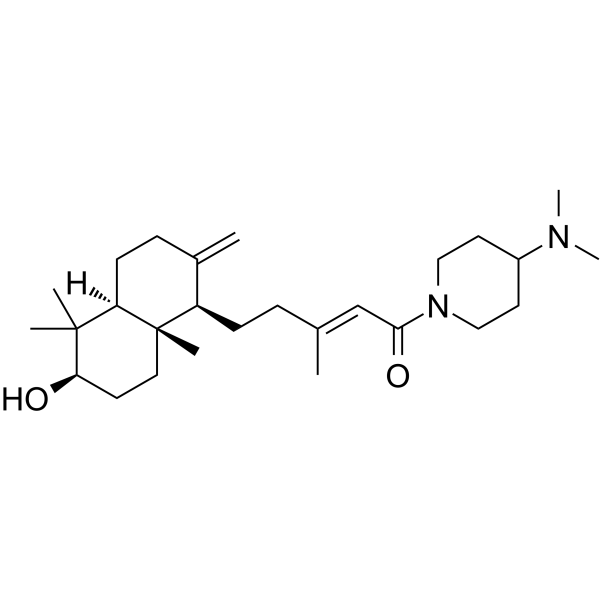
- HY-N0095
-
|
10-HCPT; 10-Hydroxycamptothecin
|
Topoisomerase
Apoptosis
|
Cancer
|
|
(S)-10-Hydroxycamptothecin (10-HCPT;10-Hydroxycamptothecin) is a DNA topoisomerase I inhibitor of isolated from the Chinese plant Camptotheca accuminata. (S)-10-Hydroxycamptothecin exhibits a remarkable apoptosis-inducing effect. (S)-10-Hydroxycamptothecin has the potential for hepatoma, gastric carcinoma, colon cancer and leukaemia treatment .
|
-
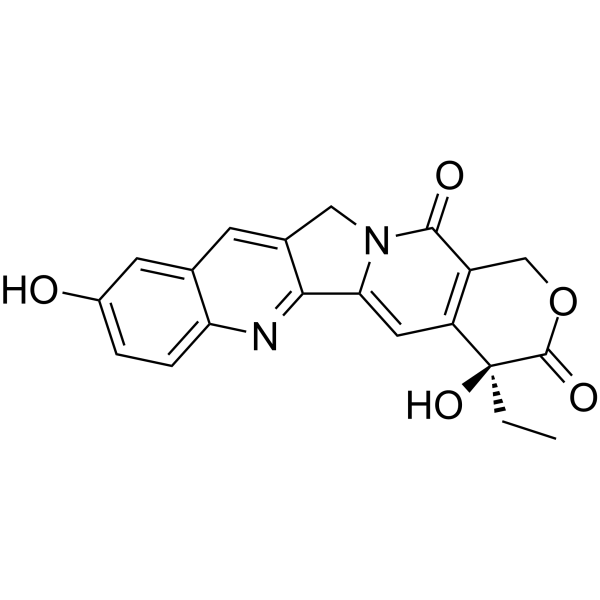
- HY-N10091
-
|
|
Apoptosis
|
Others
|
|
2,3-Dihydro-3α-methoxynimbolide is a limonoid compound isolated from the extracts of bark, leaves, roots, and seeds of Azadirachta indica A. Juss. var. siamensis Valeton. 2,3-Dihydro-3α-methoxynimbolide exhibits potent cyto-toxicities against one or more cell lines. 2,3-Dihydro-3α-methoxynimbolide activates caspases-3, -8, and -9, while increases the ratio of Bax/Bcl-2. 2,3-Dihydro-3α-methoxynimbolide induces apoptosis via both mitochondrial and death receptor pathways in AZ521 .
|
-
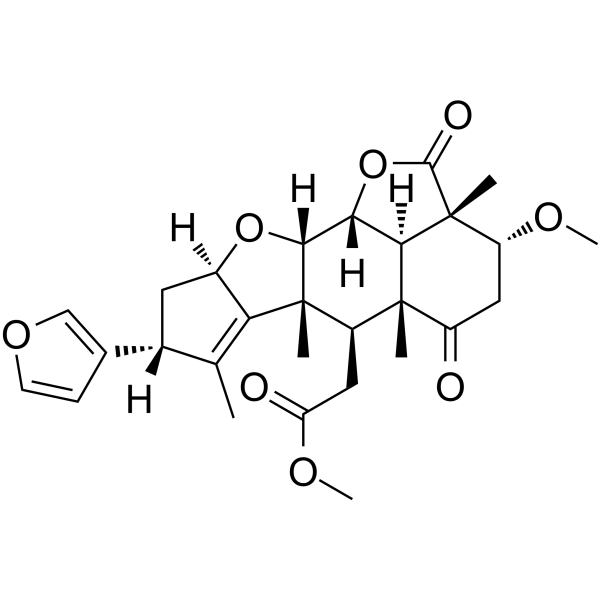
- HY-145844
-
|
|
EGFR
Apoptosis
|
Cancer
|
|
EGFR-IN-44 (Compound 6a) is a potent, orally active EGFR tyrosine kinase inhibitor with an IC50 of 4.11 nM. EGFR-IN-44 induces cell apoptosis and shows an oral bioavailability value of 33.57%. EGFR-IN-44 can be studied for non-small-cell lung cancers .
|
-
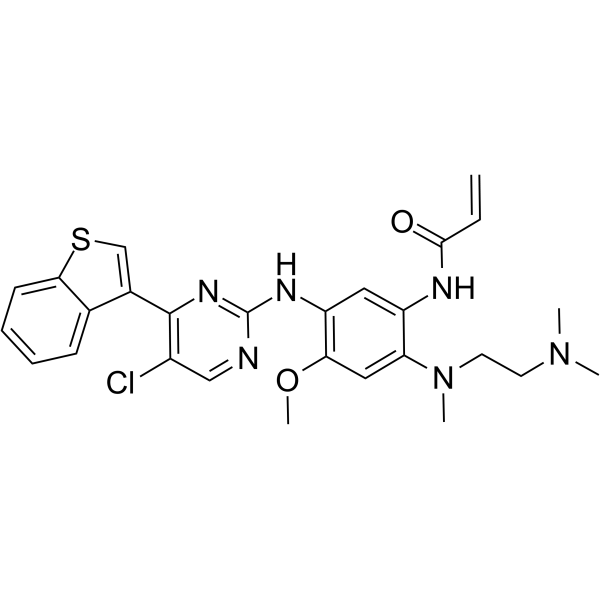
- HY-147646
-
|
|
CDK
Apoptosis
|
Cancer
|
|
CDK1/Cyc B-IN-1 (Compound 5) is a selective CDK1/Cyc B complex inhibitor with an IC50 of 97 nM. CDK1/Cyc B-IN-1 triggers apoptosis and G2/M cell cycle arrest. CDK1/Cyc B-IN-1 shows broad-spectrum cytotoxic action against cancer cell lines .
|
-
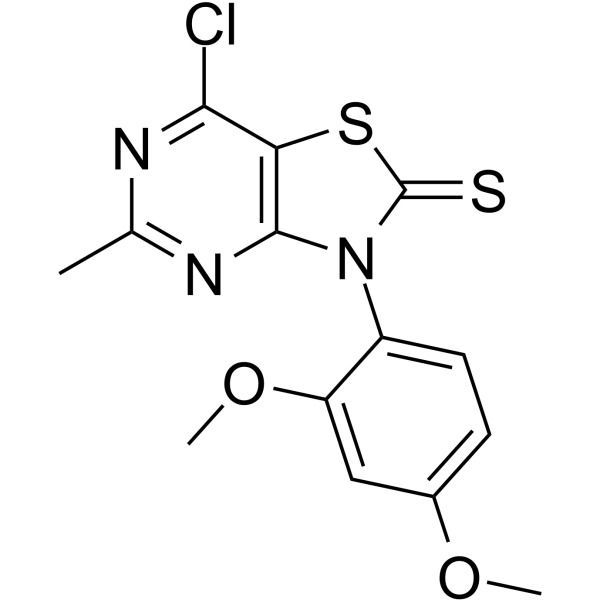
- HY-147826
-
|
|
EGFR
Apoptosis
|
Cancer
|
|
EGFR-IN-60 (Compound 7d) shows obvious inhibition of EGFR WT, EGFR T790M, EGFR L858R and JAK3 with IC50s of 83, 26, 53, and 69 nM, respectively. EGFR-IN-60 potently inhibits the growth of H1975 cells harboring EGFR T790M mutation (IC50=1.32 µM) over A431 cells overexpressing EGFR WT (IC50=4.96 µM). EGFR-IN-60 exhibits good oral absorption, potent and safe antitumor activity. EGFR-IN-60 induces cell death through apoptosis supported by increased Bax/Bcl-2 ratio .
|
-
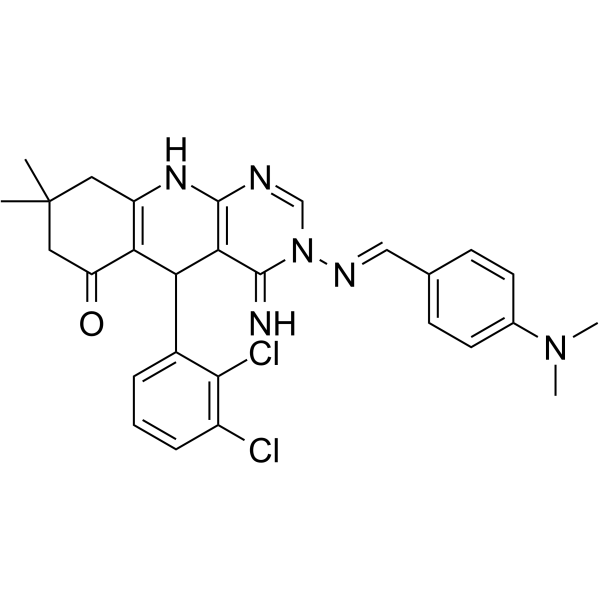
- HY-131710
-
|
|
Phosphodiesterase (PDE)
EGFR
Wnt
Apoptosis
|
Cancer
|
|
PDE5-IN-3 (compound 11j) is a potent PDE5 inhibitor with an IC50 of 1.57 nM. PDE5-IN-3 shows moderate EGFR inhibition with IC50 of 5.827 µM. PDE5-IN-3 significantly inhibits the Wnt/β-catenin pathway (IC50=1286.96 ng/mL). PDE5-IN-3 induces the intrinsic apoptotic mitochondrial pathway in HepG2 cells. PDE5-IN-3 has strong antitumor activity .
|
-
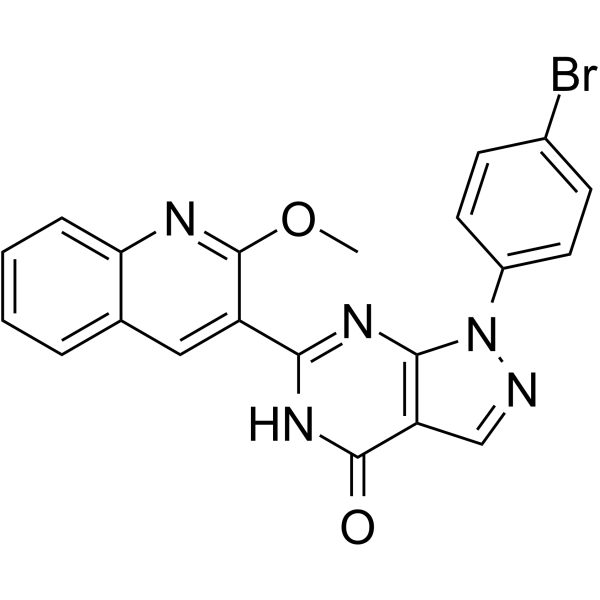
| Cat. No. |
Product Name |
Target |
Research Area |
-
- HY-P2343
-
|
|
Apoptosis
|
Cancer
|
|
BH3 hydrochloride, a BBB penetrated peptide, provoke apoptosis either by direct activation of pro-apoptotic Bax/Bak or by neutralizing anti-apoptotic Bcl-2 proteins (Bcl-2, Bcl-XL, Bcl-w, Mcl-1 and A-1) via their BH3 domian .
|
-
- HY-P3993A
-
|
14-Glycine-Humanin (human) (acetate)
|
Apoptosis
|
Neurological Disease
|
|
(Gly14)-Humanin (human) (14-Glycine-Humanin (human)) acetate is an analog of Humanin in which the 14th amino acid serine was replaced with glycine (Gly). (Gly14)-Humanin (human) acetate has anti-apoptotic and neuroprotective functions .
|
-
- HY-P5325
-
|
|
Bcl-2 Family
|
Others
|
|
Bid BH3 (80-99) is a biological active peptide. (BID is a pro-apoptotic member of the 'BH3-only' (BOPS) subset of the BCL-2 family of proteins that constitute a critical control point in apoptosis. Bid is the first of the BOPs reported to bind and activate Bcl-2, Bax, and Bak. Bid serves as a death-inducing ligand that moves from the cytosol to the mitochondrial membrane to inactivate Bcl-2 or to activate Bax.Pyroglutamyl (pGlu) peptides may spontaneously form when either Glutamine (Q) or Glutamic acid (E) is located at the sequence N-terminus. The conversion of Q or E to pGlu is a natural occurrence and in general it is believed that the hydrophobic γ-lactam ring of pGlu may play a role in peptide stability against gastrointestinal proteases. Pyroglutamyl peptides are therefore considered a normal subset of such peptides and are included as part of the peptide purity during HPLC analysis.)
|
-
- HY-103271
-
|
|
Bcl-2 Family
|
Cancer
|
|
Bax inhibitor peptide, negative control is a inhibitor of Bax. Bax inhibitor peptide, negative control inhibits Bax translocation to mitochondria and Bax-mediated apoptosis in vitro .
|
-
- HY-P3993
-
|
14-Glycine-Humanin (human)
|
Apoptosis
|
Neurological Disease
|
|
(Gly14)-Humanin (human) (14-Glycine-Humanin (human)) is an analog of Humanin in which the 14th amino acid serine was replaced with glycine (Gly). (Gly14)-Humanin (human) has anti-apoptotic and neuroprotective functions .
|
-
- HY-P0217
-
| Cat. No. |
Product Name |
Category |
Target |
Chemical Structure |
| Cat. No. |
Compare |
Product Name |
Species |
Source |
Compare Products
|
| Products |
|
| Cat. No. |
|
| Species |
|
| Source |
|
| Tag |
|
| Accession |
|
| Gene ID |
|
| Molecular Weight |
|
| Purity |
|
| Endotoxin Level |
|
| Biological Activity |
|
| Appearance |
|
| Formulation |
|
| Storage & Stability |
|
| Shipping |
|
| Free Sample |
Yes
No
|
| Size |
* This product has been "discontinued".
Optimized version of product available:
|
| Cat. No. |
Product Name |
Chemical Structure |
-
- HY-50907S
-
|
|
|
ABT 737-d8 is the deuterium labeled ABT-737. ABT-737, a BH3 mimetic, is a potent Bcl-2, Bcl-xL and Bcl-w inhibitor with EC50s of 30.3 nM, 78.7 nM, and 197.8 nM, respectively. ABT-737 induces the disruption of the BCL-2/BAX complex and BAK-dependent but BIM-independent activation of the intrinsic apoptotic pathway. ABT-737 induces autophagy and has the potential for acute myeloid leukemia (AML) research .
|
-

-
- HY-N0361S
-
|
|
|
Dihydrocapsaicin-d3is the deuterium labeledDihydrocapsaicin(HY-N0361) . Dihydrocapsaicin, a capsaicin, is a potent and selective TRPV1 (transient receptor potential vanilloid channel 1) agonist. Dihydrocapsaicin reduces AIF, Bax, and Caspase-3 expressions, and increased Bcl-2, Bcl-xL and p-Akt levels. Dihydrocapsaicin enhances the hypothermia-induced neuroprotection following ischemic stroke via PI3K/Akt regulation in rat .
|
-

| Cat. No. |
Product Name |
Application |
Reactivity |
-
- HY-P80027
-
|
Apoptosis regulator BAX; BAX; BCL-2-like protein 4; BCL2-associated X protein; BCL2-L-4; BCL2L4
|
WB, IHC-P
|
Human, Mouse, Rat |
|
BAX Antibody (YA825) is a non-conjugated and Mouse origined monoclonal antibody about 21 kDa, targeting to BAX. It can be used for WB, IHC-P assays with tag free, in the background of Human, Mouse, Rat.
|
-
- HY-P80564
-
|
Apoptosis regulator BAX; BAX; BCL-2-like protein 4; BCL2-associated X protein; BCL2-L-4; BCL2L4
|
WB
|
Human, Monkey |
|
Bax Antibody (YA826) is a non-conjugated and Mouse origined monoclonal antibody about 21 kDa, targeting to Bax (2B12). It can be used for WB assays with tag free, in the background of Human, Monkey.
|
Your information is safe with us. * Required Fields.
Inquiry Information
- Product Name:
- Cat. No.:
- Quantity:
- MCE Japan Authorized Agent:











































































